Va'etchanan
Va'etchanan (וָאֶתְחַנַּן — Hebrew for “and I pleaded,” the first word in the parashah) is the 45th weekly Torah portion (פָּרָשָׁה, parashah) in the annual Jewish cycle of Torah reading and the second in the book of Deuteronomy. It constitutes Deuteronomy 3:23–7:11. The parashah is made up of 7,343 Hebrew letters, 1,878 Hebrew words, and 122 verses, and can occupy about 249 lines in a Torah Scroll (סֵפֶר תּוֹרָה, Sefer Torah).[1]
Jews in the Diaspora generally read it in late July or August. It is always read on the special Sabbath Shabbat Nachamu, the Sabbath immediately after Tisha B'Av. As the parashah describes how the Israelites would sin and be banished from the Land of Israel, Jews also read part of the parashah, Deuteronomy 4:25–40, as the Torah reading for the morning (Shacharit) prayer service on Tisha B'Av, which commemorates the destruction of both the First Temple and Second Temple in Jerusalem.
The parashah tells how Moses asked to see the Land of Israel, puts forth arguments to obey the law, recounts the setting up of the Cities of Refuge, recites the Ten Commandments and the Shema, and gives instructions for the Israelites’ conquest of the Land.
.jpg)
Readings
In traditional Sabbath Torah reading, the parashah is divided into seven readings, or עליות, aliyot. In the masoretic text of the Tanakh (Hebrew Bible), Parashah Va'etchanan has six "open portion" (פתוחה, petuchah) divisions (roughly equivalent to paragraphs, often abbreviated with the Hebrew letter פ (peh)). Parashah Va'etchanan has several further subdivisions, called "closed portions" (סתומה, setumah) (abbreviated with the Hebrew letter ס (samekh)) within the open portion (פתוחה, petuchah) divisions. The first open portion (פתוחה, petuchah) divides the first reading (עליות, aliyot). The second open portion (פתוחה, petuchah) goes from the middle of the first reading (עליה, aliyah) to the middle of the second reading (עליה, aliyah). The third open portion (פתוחה, petuchah) concludes the second reading (עליה, aliyah). The fourth open portion (פתוחה, petuchah) corresponds to the third reading. The fifth open portion (פתוחה, petuchah) spans the fourth and fifth readings (עליות, aliyot). And the sixth open portion (פתוחה, petuchah) spans the sixth and seventh readings (עליות, aliyot). Several closed portion (סתומה, setumah) divisions, notably one for every commandment, further divide the fourth and sixth readings (עליות, aliyot).[2]
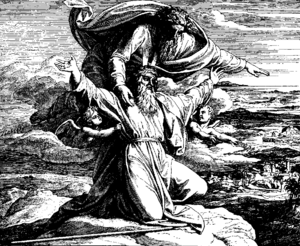
First reading
In the first reading (עליה, aliyah), Moses pleaded with God to let him cross over and see the other side of the Jordan River.[3] But God was wrathful with Moses and would not listen, telling Moses never to speak of the matter again, and Moses blamed his punishment on the Israelites.[4] God directed Moses to climb the summit of Pisgah and look at the land.[5] And God told Moses to give Joshua his instructions and imbue him with strength and courage, for Joshua was to lead the people and allot to them the land.[6] The first open portion (פתוחה, petuchah) ends here with the end of the chapter.[7]

Moses exhorted the Israelites to heed God’s laws, not to add anything to them, and not to take anything away from them, so that they might live to enter and occupy the land that God was giving them.[8] Moses noted that in the sin of Baal-peor, God wiped out every person who followed Baal-peor, while preserving alive those who held fast to God.[9] The first reading (עליה, aliyah) ends here.[10]
Second reading
In the second reading (עליה, aliyah), Moses argued that observing the laws faithfully would prove to other peoples the Israelites’ wisdom and discernment, for no other great nation had a god so close at hand as God, and no other great nation had laws as perfect as God’s.[11]
Moses urged the Israelites to take utmost care not to forget the things that they saw, and to make them known to their children and children’s children: How they stood before God at Horeb, the mountain was ablaze with flames, God spoke to them out of the fire, and God declared to them the Ten Commandments.[12] At the same time, God commanded Moses to impart to the Israelites laws for them to observe in the land that they were about to occupy.[13]
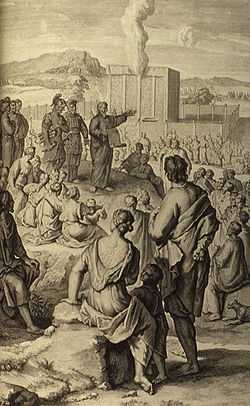
Because the Israelites saw no shape when God spoke to them out of the fire at Horeb, Moses warned them not to make for themselves a sculptured image in any likeness whatever — the form of a man, woman, beast, bird, creeping thing, or fish.[14] And when they looked up and saw the sun, moon, stars, and heaven, they were not to be lured into bowing down to them or serving them, for God allotted those things to other peoples, but God took the Israelites and brought them out of Egypt to be God’s very own people.[15]
Moses said that God was angry with him on account of the Israelites, and God swore that Moses would not enter the land but would die in the land east of the Jordan.[16] Moses cautioned the Israelites not to forget the covenant that God concluded with them, and not to make a sculptured image, for God is a consuming fire, an impassioned God.[17] The second open portion (פתוחה, petuchah) ends here.[18]
Moses called heaven and earth to witness against the Israelites that should they make for themselves a sculptured image when they were in the land, then God would scatter them among the peoples, leaving only a scant few alive.[19] There in exile they would serve man-made gods of wood and stone, that would not be able to see, hear, eat, or smell.[20] But when they were in distress and they searched for God with all their heart and soul, returned to God, and obeyed God, then they would find God, even there.[21] For God is a compassionate God, Who would not fail them, let them perish, or forget the covenant that God made with their fathers.[22]
Moses invited the Israelites to consider whether any people had ever heard the voice of a god speaking out of a fire and survived, or any god had taken one nation from the midst of another by prodigious acts and awesome power as their God had done for them in Egypt before their very eyes.[23] Moses said that it had been clearly demonstrated to them that the Lord alone is God and there is none beside God.[24] Moses thus admonished them to observe God’s laws and commandments, which Moses enjoined upon them that day, that it might go well with them and their children, and that they might long remain in the land that God was assigning to them for all time.[25] The second reading (עליה, aliyah) and the third open portion (פתוחה, petuchah) end here.[26]
Third reading
In the third reading (עליה, aliyah), Moses set aside three cities of refuge on the east side of the Jordan to which a manslayer who unwittingly slew a person without having been hostile to him in the past could escape and live: Bezer among the Reubenites, Ramoth in Gilead among the Gadites, and Golan in Bashan among the Manassites.[27] The third reading (עליה, aliyah) and the fourth open portion (פתוחה, petuchah) end with Deuteronomy 4:49..[28]
Fourth reading
In the fourth reading (עליה, aliyah), Moses summoned the Israelites and called on them to hear the laws that he proclaimed that day, to study and observe them faithfully.[29] At Horeb, God made a covenant with them — not with their fathers, but with them, the living, every one of them.[30] God spoke to them face to face out of the fire on the mountain.[31] Moses stood between God and them to convey God’s words to them, for they were afraid of the fire and did not go up the mountain.[32] A closed portion (סתומה, setumah) ends here.[33]

God said the Ten Commandments:
- “I the Lord am your God.”[34]
- “You shall have no other gods beside Me. You shall not make for yourself a sculptured image, any likeness of what is in the heavens above, or on the earth below, or in the waters below the earth. You shall not bow down to them or serve them.”[35] A closed portion (סתומה, setumah) ends with Deuteronomy 5:9 (5:10 in NJPS).[36]
- “You shall not swear falsely by the name of the Lord your God.”[37] A closed portion (סתומה, setumah) ends here.[38]
- “Observe the Sabbath day and keep it holy.”[39] A closed portion (סתומה, setumah) ends with Deuteronomy 5:14 (5:15 in NJPS).[40]
- “Honor your father and your mother.”[41] A closed portion (סתומה, setumah) ends here.[42]
- “You shall not murder.” A closed portion (סתומה, setumah) ends here.[43]
- “You shall not commit adultery.” A closed portion (סתומה, setumah) ends here.[44]
- “You shall not steal.” A closed portion (סתומה, setumah) ends here.[45]
- “You shall not bear false witness against your neighbor.”[46] A closed portion (סתומה, setumah) ends here.[47]
- “You shall not covet your neighbor’s wife. A closed portion (סתומה, setumah) ends here.[48] You shall not crave your neighbor’s house, or his field, or his male or female slave, or his ox, or his ass, or anything that is your neighbor’s.”[49] The fourth reading (עליה, aliyah) and a closed portion (סתומה, setumah) ends here.[50]
Fifth reading
In the fifth reading (עליה, aliyah), God spoke these words to the whole congregation at the mountain, with a mighty voice out of the fire and the dense clouds, and God inscribed them on two stone tablets, which God gave to Moses.[51] When the Israelites heard the voice out of the darkness and saw the mountain ablaze with fire, the tribal heads and elders asked Moses to hear all that God had to say and then tell the people, and they would willingly obey.[52] The fifth reading (עליה, aliyah) and the fifth open portion (פתוחה, petuchah) end with Deuteronomy 6:3.[53]

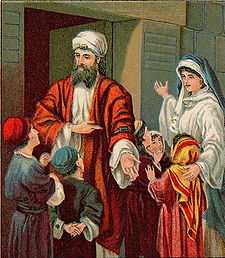
Sixth reading
In the sixth reading (עליה, aliyah), Moses imparted God’s instruction, the Shema and V'ahavta, saying: “Hear, O Israel: the Lord our God, the Lord is one. And you shall love the Lord your God with all your heart, and with all your soul, and with all your might. And these words, which I command you this day, shall be upon your heart; and you shall teach them diligently to your children, and shall talk of them when you sit in your house, and when you walk by the way, and when you lie down, and when thou rise up. And you shall bind them for a sign upon your hand, and they shall be for frontlets between your eyes. And you shall write them upon the doorposts of your house, and upon your gates.”[54] A closed portion (סתומה, setumah) ends here.[55]
Moses exhorted the Israelites, when God brought them into the land and they ate their fill, not to forget the God who freed them from bondage in Egypt, to revere and worship only God, and to swear only by God’s name.[56] Moses warned the Israelites not to follow other gods, lest the anger of God wipe them off the face of the earth.[57] A closed portion (סתומה, setumah) ends here.[58]
Moses warned the Israelites not to try God, as they did at Massah, but to keep God’s commandments and do what is right in God’s sight, that it might go well with them, that they might be able to possess the land, and that all their enemies might be driven out before them.[59] A closed portion (סתומה, setumah) ends here.[60]
And when their children would ask the meaning of the commandments, they were to answer that they were slaves to Pharaoh in Egypt, and God produced marvelous and destructive signs and portents, freed them with a mighty hand to give them the land, and then commanded them to observe all these laws for their lasting good and survival.[61] The sixth reading (עליה, aliyah) and a closed portion (סתומה, setumah) end with Deuteronomy 6:25.[62]
Seventh reading
In the seventh reading (עליה, aliyah), Moses told the Israelites that when God brought them to the land and dislodged seven nations before them — the Hittites, Girgashites, Amorites, Canaanites, Perizzites, Hivites, and Jebusites — the Israelites were to doom them to destruction, grant them no terms, and give them no quarter.[63] The Israelites were not to intermarry with them, for they would turn the Israelites’ children away from God to worship other gods, and God’s anger would wipe the Israelites out.[64] The Israelites were to tear down the nations’ altars, smash their pillars, cut down their sacred posts, and consign their images to the fire.[65]
The Israelites were a people consecrated to God, and God chose them from all the peoples on earth to be God’s treasured people.[66] God chose them not because they were the most numerous of peoples, but because God favored them and kept the oath God made with their fathers.[67] Moses told them to note that only God is God, the steadfast God who keeps God’s covenant faithfully to the thousandth generation of those who love God and keep God’s commandments, but who instantly requites with destruction those who reject God.[68] The maftir (מפטיר) reading concludes the parashah with Deuteronomy 7:9–11, and Deuteronomy 7:11 concludes the sixth open portion (פתוחה, petuchah).[69]
Readings according to the triennial cycle
Jews who read the Torah according to the triennial cycle of Torah reading read the parashah according to a different schedule.[70]
In inner-Biblical interpretation
The parashah has parallels or is discussed in these Biblical sources:[71]
Deuteronomy chapter 4
Moses calls heaven and earth to serve as witnesses against Israel in Deuteronomy 4:26, 30:19, 31:28, and 32:1. Similarly, Psalm 50:4–5 reports that God “summoned the heavens above, and the earth, for the trial of His people,” saying “Bring in My devotees, who made a covenant with Me over sacrifice!” Psalm 50:6 continues: “Then the heavens proclaimed His righteousness, for He is a God who judges.”
In classical rabbinic interpretation
The parashah is discussed in these rabbinic sources from the era of the Mishnah and the Talmud:
Deuteronomy chapter 3
Noting that Deuteronomy 3:21 and 3:23 both use the same expression “at that time” (בָּעֵת הַהִוא, ha-hiv ba-eit), a Midrash deduced that the events of the two verses took place at the same time. Thus Rav Huna taught that as soon as God told Moses to hand over his office to Joshua, Moses immediately began to pray to be permitted to enter the Promised land. The Midrash compared Moses to a governor who could be sure that the king would confirm whatever orders he gave so long as he retained his office. The governor redeemed whomever he desired and imprisoned whomever he desired. But as soon as the governor retired and another was appointed in his place, the gatekeeper would not let him enter the king’s palace. Similarly, as long as Moses remained in office, he imprisoned whomever he desired and released whomever he desired, but when he was relieved of his office and Joshua was appointed in his stead, and he asked to be permitted to enter the Promised Land, God in Deuteronomy 3:26 denied his request.[72]
The Gemara deduced from Moses’s example in Deuteronomy 3:23 that one should seek a suppliant frame of mind before praying. Rav Huna and Rav Hisda were discussing how long to wait between recitations of the Amidah if one erred in the first reciting and needed to repeat the prayer. One said: long enough for the person praying to fall into a suppliant frame of mind, citing the words “And I supplicated the Lord” in Deuteronomy 3:23. The other said: long enough to fall into an interceding frame of mind, citing the words “And Moses interceded” in Exodus 32:11.[73]
Rabbi Simlai deduced from Deuteronomy 3:23–25 that one should always first praise God at the beginning of prayer, for Moses praised God in Deuteronomy 3:24 before he asked God in Deuteronomy 3:25 to let him see the good land.[74] Rabbi Eleazar deduced from Deuteronomy 3:26–27 that God let Moses see the Promised Land only because Moses prayed, and thus Rabbi Eleazar concluded that prayer is more effective than good deeds, for no one was greater in good deeds than Moses, and yet God let Moses see the land only after Moses prayed.[75]
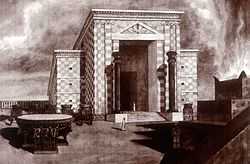
Rabban Johanan ben Zakai interpreted the word “Lebanon” in Deuteronomy 3:25 to refer to the Temple in Jerusalem and “that goodly mountain” to refer to the Temple Mount. Thus one can interpret Deuteronomy 3:25 to say that Moses asked to see God’s House.[76] Similarly, a Midrash interpreted the word “Lebanon” in Deuteronomy 3:25 to refer to the altar. Rabbi Simeon ben Yohai explained that the altar was called “Lebanon” because it made white (malbin) the sins of Israel, as indicated by the words of Isaiah 1:18: “though your sins be as scarlet, they shall be as white (yalbinu) as snow; though they be red like crimson, they shall be as wool.” Rabbi Tabyomi said that the altar was called “Lebanon” because all hearts (lebabot) rejoice there, as indicated by the words of Psalm 48:3: “Fair in situation, the joy of the whole earth, even Mount Zion.” And the Rabbis said that the altar was called “Lebanon” because of the words of 1 Kings 9:3, which says of God and the Temple: “My eyes and My heart (libbi) shall be there perpetually.[77]
Another Midrash employed the understanding of “Lebanon” as the Temple to explain the role of gold in the world. Rabbi Simeon ben Lakish taught that the world did not deserve to have the use of gold. But God created gold for the sake of the Temple. The Midrash deduced this from the use of the word “good” in both Genesis 2:12, where it says, “the gold of that land is good,” and Deuteronomy 3:25, where it says, “that goodly hill-country, and Lebanon.”[78]
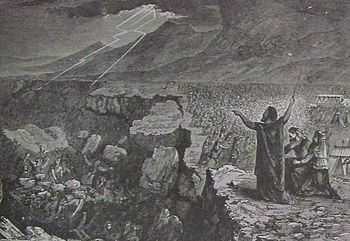
Rabbi Levi taught that God told Moses “enough!” in Deuteronomy 3:26 to repay Moses measure for measure for when Moses told Korah “enough!” in Numbers 16:3. The Gemara provided another explanation of the word “enough! (רַב, rav)” in Deuteronomy 3:26: God was telling Moses that Moses had a master (רַב, rav), namely Joshua, waiting to assume authority to lead the Israelites into the Promised Land, and thus Moses should not delay another master’s reign by prolonging his own. The Gemara provided a third explanation of the word “enough!”: God was telling Moses not to petition him anymore, so that people should not say: “How severe is the Master, and how persistent is the student.” The Gemara explained why God was so hard on Moses with a Baraita taught in the School of Rabbi Ishmael: according to the camel is the burden; that is, a stronger, more righteous one must bear a greater burden.[79]
The School of Rabbi Ishmael taught that whenever Scripture uses the word “command” (צַו, tzav) (as Deuteronomy 3:28 does), it denotes exhortation to obedience immediately and for all time. A Baraita deduced exhortation to immediate obedience from the use of the word “command” in Deuteronomy 3:28, which says, “charge Joshua, and encourage him, and strengthen him.” And the Baraita deduced exhortation to obedience for all time from the use of the word “command” in Numbers 15:23, which says, “even all that the Lord has commanded you by the hand of Moses, from the day that the Lord gave the commandment, and onward throughout your generations.”[80]
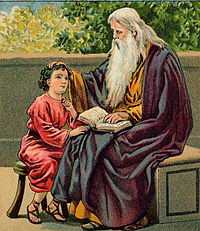
Deuteronomy chapter 4
In Deuteronomy 4:1, Moses calls on Israel to heed the “statutes” (hukim) and “ordinances” (mishpatim). The Rabbis in a Baraita taught that the “ordinances” (mishpatim) were commandments that logic would have dictated that we follow even had Scripture not commanded them, like the laws concerning idolatry, adultery, bloodshed, robbery, and blasphemy. And “statutes” (hukim) were commandments that the Adversary challenges us to violate as beyond reason, like those relating to shaatnez (in Leviticus 19:19 and Deuteronomy 22:11), halizah (in Deuteronomy 25:5–10), purification of the person with tzaraat (in Leviticus 14), and the scapegoat (in Leviticus 16). So that people do not think these “ordinances” (mishpatim) to be empty acts, Leviticus 18:4, which speaks of the “statutes” (hukim) and “ordinances” (mishpatim), says “I am the Lord,” indicating that the Lord made these statutes, and we have no right to question them.[81]
The Gemara cited Deuteronomy 4:4 as an instance of where the Torah alludes to life after death. The Gemara related that sectarians asked Rabban Gamaliel where Scripture says that God will resurrect the dead. Rabban Gamaliel answered them from the Torah, the Prophets (נְבִיאִים, Nevi'im), and the Writings (כְּתוּבִים, Ketuvim), yet the sectarians did not accept his proofs. From the Torah, Rabban Gamaliel cited Deuteronomy 31:16, “And the Lord said to Moses, ‘Behold, you shall sleep with your fathers and rise up [again].’” But the sectarians replied that perhaps Deuteronomy 31:16 reads, “and the people will rise up.” From the Prophets, Rabban Gamaliel cited Isaiah 26:19, “Your dead men shall live, together with my dead body shall they arise. Awake and sing, you who dwell in the dust: for your dew is as the dew of herbs, and the earth shall cast out its dead.” But the sectarians rejoined that perhaps Isaiah 26:19 refers to the dead whom Ezekiel resurrected in Ezekiel 27. From the Writings, Rabban Gamaliel cited Song of Songs 7:9, “And the roof of your mouth, like the best wine of my beloved, that goes down sweetly, causing the lips of those who are asleep to speak.” (As the Rabbis interpreted Song of Songs as a dialogue between God and Israel, they understood Song 7:9 to refer to the dead, whom God will cause to speak again.) But the sectarians rejoined that perhaps Song 7:9 means merely that the lips of the departed will move. For Rabbi Johanan said that if a halachah (legal ruling) is said in any person’s name in this world, the person’s lips speak in the grave, as Song 7:9 says, “causing the lips of those that are asleep to speak.” Thus Rabban Gamaliel did not satisfy the sectarians until he quoted Deuteronomy 11:21, “which the Lord swore to your fathers to give to them.” Rabban Gamaliel noted that God swore to give the land not “to you” (the Israelites whom Moses addressed) but “to them” (the Patriarchs, who had long since died). Others say that Rabban Gamaliel proved it from Deuteronomy 4:4, “But you who did cleave to the Lord your God are alive every one of you this day.” And (the superfluous use of “this day” implies that) just as you are all alive today, so shall you all live again in the world to come.[82]
A Midrash taught that Deuteronomy 1:7, Genesis 15:18, and Joshua 1:4 call the Euphrates “the Great River” because it encompasses the Land of Israel. The Midrash noted that at the creation of the world, the Euphrates was not designated “great.” But it is called “great” because it encompasses the Land of Israel, which Deuteronomy 4:7 calls a “great nation.” As a popular saying said, the king’s servant is a king, and thus Scripture calls the Euphrates great because of its association with the great nation of Israel.[83]
A Baraita deduced from the words “you shall make them known to your children, and your children’s children” in Deuteronomy 4:9 that if a parent teaches a child Torah, Scripture ascribes merit as though the parent had taught the child, the child’s children, and so on, until the end of all time.[84] Rabbi Joshua ben Levi taught that if a parent teaches a child (or some say a grandchild) Torah, Scripture accounts it as if the parent had received the Torah at Mount Sinai, as Deuteronomy 4:9 says, “And you shall make them known to your children and your children's children,” and immediately thereafter, Deuteronomy 4:10 says, “The day that you stood before the Lord your God in Horeb.”[85] Rabbi Hiyya bar Abba once found Rabbi Joshua ben Levi, who had hurriedly thrown a cloth upon his head, taking his child (or some say grandchild) to the synagogue to study. When Rabbi Hiyya asked Rabbi Joshua what was going on, Rabbi Joshua replied that it was no small thing that the words “you shall make them known to your children and your children's children” are immediately followed by the words “The day that you stood before the Lord your God in Horeb.” From then on, Rabbi Hiyya bar Abba did not eat breakfast before revising the previous day's lesson with his child (or some say grandchild) and adding another verse. And Rabbah son of Rav Huna did not eat breakfast until he took his child (or some say grandchild) to school.[86]
A Baraita deduced from the proximity of the words “And you shall make them known to your children and your children's children” in Deuteronomy 4:9 to the words “The day on which you stood before the Lord your God in Horeb” in Deuteronomy 4:10 that just as at Mount Sinai, the Israelites stood in dread, fear, trembling, and quaking, so when one teaches Torah to one’s child, one should do so in dread, fear, trembling, and quaking.[87]
The Rabbis related Jacob’s dream in Genesis 28:12–13 to Sinai. The “ladder” symbolizes Mount Sinai. That the ladder is “set upon (מֻצָּב, mutzav) the earth” recalls Exodus 19:17, which says, “And they stood (וַיִּתְיַצְּבוּ, vayityatzvu) at the nether part of the mount.” The words of Genesis 28:12, “and the top of it reached to heaven,” echo those of Deuteronomy 4:11, “And the mountain burned with fire to the heart of heaven.” “And behold the angels of God” alludes to Moses and Aaron. “Ascending” parallels Exodus 19:3: “And Moses went up to God.” “And descending” parallels Exodus 19:14: “And Moses went down from the mount.” And the words “and, behold, the Lord stood beside him” in Genesis 28:13 parallel the words of Exodus 19:20: “And the Lord came down upon Mount Sinai.”[88]
Rabbi Johanan counted ten instances in which Scripture refers to the death of Moses (including one in the parashah), teaching that God did not finally seal the harsh decree until God declared it to Moses. Rabbi Johanan cited these ten references to the death of Moses: (1) Deuteronomy 4:22: “But I must die in this land; I shall not cross the Jordan”; (2) Deuteronomy 31:14: “The Lord said to Moses: ‘Behold, your days approach that you must die’”; (3) Deuteronomy 31:27: “[E]ven now, while I am still alive in your midst, you have been defiant toward the Lord; and how much more after my death”; (4) Deuteronomy 31:29: “For I know that after my death, you will act wickedly and turn away from the path that I enjoined upon you”; (5) Deuteronomy 32:50: “And die in the mount that you are about to ascend, and shall be gathered to your kin, as your brother Aaron died on Mount Hor and was gathered to his kin”; (6) Deuteronomy 33:1: “This is the blessing with which Moses, the man of God, bade the Israelites farewell before his death”; (7) Deuteronomy 34:5: “So Moses the servant of the Lord died there in the land of Moab, at the command of the Lord”; (8) Deuteronomy 34:7: “Moses was 120 years old when he died”; (9) Joshua 1:1: “Now it came to pass after the death of Moses”; and (10) Joshua 1:2: “Moses My servant is dead.” Rabbi Johanan taught that ten times it was decreed that Moses should not enter the Land of Israel, but the harsh decree was not finally sealed until God revealed it to him and declared (as reported in Deuteronomy 3:27): “It is My decree that you should not pass over.”[89]


Rabbi Jonah taught in the name of Rabbi Levi that the world was created with a letter bet (the first letter in Genesis 1:1, which begins, בְּרֵאשִׁית, בָּרָא אֱלֹהִים, Bereishit bara Elohim, “In the beginning God created”) because just as the letter bet is closed at the sides but open in front, so one is not permitted to investigate what is above and what is below, what is before and what is behind. Similarly, Bar Kappara reinterpreted the words of Deuteronomy 4:32 to say, “ask not of the days past, which were before you, since the day that God created man upon the earth,” teaching that one may speculate from the day that days were created, but one should not speculate on what was before that. And one may investigate from one end of heaven to the other, but one should not investigate what was before this world.[90] Similarly, the Rabbis in a Baraita interpreted Deuteronomy 4:32 to forbid inquiry into the work of creation in the presence of two people, reading the words “for ask now of the days past” to indicate that one may inquire, but not two. The Rabbis reasoned that the words “since the day that God created man upon the earth” in Deuteronomy 4:32 taught that one must not inquire concerning the time before creation. The Rabbis reasoned that the words “the days past that were before you” in Deuteronomy 4:32 taught that one may inquire about the six days of creation. The Rabbis further reasoned that the words “from the one end of heaven to the other” in Deuteronomy 4:32 taught that one must not inquire about what is beyond the universe, what is above and what is below, what is before and what is after.[91]
Rabbi Eleazar read the words "since the day that God created man upon the earth, and ask from the one side of heaven" in Deuteronomy 4:32 to read, "from the day that God created Adam on earth and to the end of heaven." Thus Rabbi Eleazar read Deuteronomy 4:32 to intimate that when God created Adam in Genesis 1:26–27, Adam extended from the earth to the firmament. But as soon as Adam sinned, God placed God's hand upon Adam and diminished him, as Psalm 139:5 says: "You have fashioned me after and before, and laid Your hand upon me." Similarly, Rav Judah in the name of Rav taught that when God created Adam in Genesis 1:26–27, Adam extended from one end of the world to the other, reading Deuteronomy 4:32 to read, "Since the day that God created man upon the earth, and from one end of heaven to the other." (And Rav Judah in the name of Rav also taught that as soon as Adam sinned, God placed God's hand upon Adam and diminished him.) The Gemara reconciled the interpretations of Rabbi Eleazar and Rav Judah in the name of Rav by concluding that the distance from the earth to the firmament must equal the distance from one end of heaven to the other.[92]
Rabbi Levi addressed the question that Deuteronomy 4:33 raises: “Did ever a people hear the voice of God speaking out of the midst of the fire, as you have heard, and live?” (Deuteronomy 4:33, in turn, refers back to the encounter at Sinai reported at Exodus 19:18–19, 20:1, and after.) Rabbi Levi taught that the world would not have been able to survive hearing the voice of God in God’s power, but instead, as Psalm 29:4 says, “The voice of the Lord is with power.” That is, the voice of God came according to the power of each individual — young, old, or infant — to receive it.[93]
The Gemara counted only three verses in the Torah that indisputably refer to God’s Kingship, and thus are suitable for recitation on Rosh Hashanah: Numbers 23:21, “The Lord his God is with him, and the shouting for the King is among them”; Deuteronomy 33:5, “And He was King in Jeshurun”; and Exodus 15:18, “The Lord shall reign for ever and ever.” Rabbi Jose also counted as Kingship verses Deuteronomy 6:4, “Hear, O Israel, the Lord our God the Lord is One”; Deuteronomy 4:39, “And you shall know on that day and lay it to your heart that the Lord is God, . . . there is none else”; and Deuteronomy 4:35, “To you it was shown, that you might know that the Lord is God, there is none else beside Him”; but Rabbi Judah said that none of these three is a Kingship verse. (The traditional Rosh Hashanah liturgy follows Rabbi Jose and recites Numbers 23:21, Deuteronomy 33:5, and Exodus 15:18, and then concludes with Deuteronomy 6:4.)[94]
Rabbi Johanan taught that sorcerers are called כַשְּׁפִים, kashefim, because they seek to contradict the power of Heaven. (Some read כַשְּׁפִים, kashefim, as an acronym for כחש פמליא, kachash pamalia, “contradicting the legion [of Heaven].”) But the Gemara noted that Deuteronomy 4:35 says, “There is none else besides Him (God).” Rabbi Hanina interpreted Deuteronomy 4:35 to teach that even sorcerers have no power to oppose God’s will. A woman once tried to take earth from under Rabbi Hanina's feet (so as to perform sorcery against him). Rabbi Hanina told her that if she could succeed in her attempts, she should go ahead, but (he was not concerned, for) Deuteronomy 4:35 says, “There is none else beside Him.” But the Gemara asked whether Rabbi Johanan had not taught that sorcerers are called כַשְּׁפִים, kashefim, because they (actually) contradict the power of Heaven. The Gemara answered that Rabbi Hanina was in a different category, owing to his abundant merit (and therefore Heaven protected him).[95]
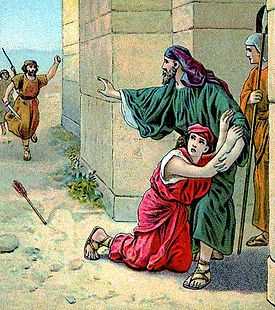
Chapter 2 of tractate Makkot in the Mishnah, Tosefta, Jerusalem Talmud, and Babylonian Talmud interpreted the laws of the cities of refuge in Exodus 21:12–14, Numbers 35:1–34, Deuteronomy 4:41–43, and 19:1–13.[96]
The Mishnah taught that those who killed in error went into banishment. One would go into banishment if, for example, while one was pushing a roller on a roof, the roller slipped over, fell, and killed someone. One would go into banishment if while one was lowering a cask, it fell down and killed someone. One would go into banishment if while coming down a ladder, one fell and killed someone. But one would not go into banishment if while pulling up the roller it fell back and killed someone, or while raising a bucket the rope snapped and the falling bucket killed someone, or while going up a ladder one fell down and killed someone. The Mishnah’s general principle was that whenever the death occurred in the course of a downward movement, the culpable person went into banishment, but if the death did not occur in the course of a downward movement, the person did not go into banishment. If while chopping wood, the iron slipped from the ax handle and killed someone, Rabbi taught that the person did not go into banishment, but the sages said that the person did go into banishment. If from the split log rebounding killed someone, Rabbi said that the person went into banishment, but the sages said that the person did not go into banishment.[97]
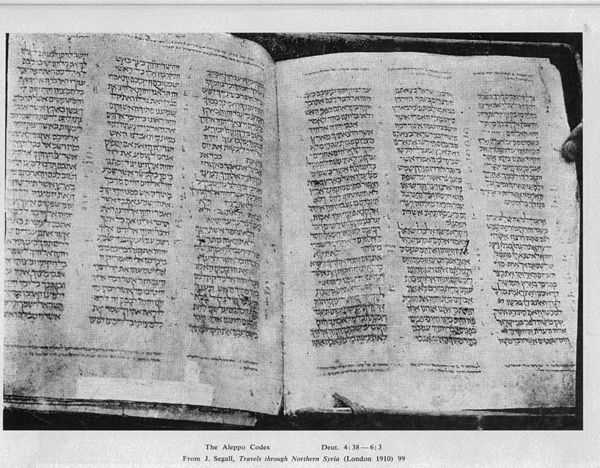
Rabbi Jose bar Judah taught that to begin with, they sent a slayer to a city of refuge, whether the slayer killed intentionally or not. Then the court sent and brought the slayer back from the city of refuge. The Court executed whomever the court found guilty of a capital crime, and the court acquitted whomever the court found not guilty of a capital crime. The court restored to the city of refuge whomever the court found liable to banishment, as Numbers 35:25 ordained, “And the congregation shall restore him to the city of refuge from where he had fled.”[98] Numbers 35:25 also says, “The manslayer . . . shall dwell therein until the death of the high priest, who was anointed with the holy oil,” but the Mishnah taught that the death of a high priest who had been anointed with the holy anointing oil, the death of a high priest who had been consecrated by the many vestments, or the death of a high priest who had retired from his office each equally made possible the return of the slayer. Rabbi Judah said that the death of a priest who had been anointed for war also permitted the return of the slayer. Because of these laws, mothers of high priests would provide food and clothing for the slayers in cities of refuge so that the slayers might not pray for the high priest’s death.[99] If the high priest died at the conclusion of the slayer’s trial, the slayer did not go into banishment. If, however, the high priests died before the trial was concluded and another high priest was appointed in his stead and then the trial concluded, the slayer returned home after the new high priest’s death.[100]
Because Reuben was the first to engage in life saving of his brother Joseph in Genesis 37:21, God decreed that the Cities of Refuge would be set up first within the borders of the Tribe of Reuben in Deuteronomy 4:43.[101]
Deuteronomy chapter 5
Rabbi Azariah in the name of Rabbi Judah ben Rabbi Simon taught that the familiarity with which God spoke with the Israelites in Deuteronomy 5:4 befit the infancy of Israel’s nationhood. Rabbi Azariah in the name of Rabbi Judah ben Rabbi Simon explained in a parable. A mortal king had a daughter whom he loved exceedingly. So long as his daughter was small, he would speak with her in public or in the courtyard. When she grew up and reached puberty, the king determined that it no longer befit his daughter's dignity for him to converse with her in public. So he directed that a pavilion be made for her so that he could speak with his daughter inside the pavilion. In the same way, when God saw the Israelites in Egypt, they were in the childhood of their nationhood, as Hosea 11:1 says, “When Israel was a child, then I loved him, and out of Egypt I called My son.” When God saw the Israelites at Sinai, God spoke with them as Deuteronomy 5:4 says, “The Lord spoke with you face to face.” As soon as they received the Torah, became God’s nation, and said (as reported in Exodus 24:7), “All that the Lord has spoken will we do, and obey,” God observed that it was no longer in keeping with the dignity of God’s children that God should converse with them in the open. So God instructed the Israelites to make a Tabernacle, and when God needed to communicate with the Israelites, God did so from the Tabernacle. And thus Numbers 7:89 bears this out when it says, “And when Moses went into the tent of meeting that He might speak with him.”[102]
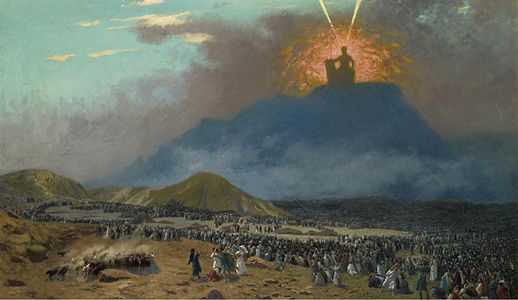
The Mishnah taught that the priests recited the Ten Commandments daily.[103] The Gemara, however, taught that although the Sages wanted to recite the Ten Commandments along with the Shema in precincts outside of the Temple, they soon abolished their recitation, because the Sages did not want to lend credence to the arguments of the heretics (who might argue that Jews honored only the Ten Commandments).[104]
The Gemara taught that the Israelites heard the words of the first two commandments (in Exodus 20:2–5 (20:3–6 in NJPS) and Deuteronomy 5:6–9 (5:7–10 in NJPS)) directly from God. Rabbi Simlai expounded that a total of 613 commandments were communicated to Moses — 365 negative commandments, corresponding to the number of days in the solar year, and 248 positive commandments, corresponding to the number of the parts in the human body. Rav Hamnuna said that one may derive this from Deuteronomy 33:4, “Moses commanded us Torah, an inheritance of the congregation of Jacob.” The letters of the word “Torah” (תּוֹרָה) have a numerical value of 611 (as ת equals 400, ו equals 6, ר equals 200, and ה equals 5). And the Gemara did not count among the commandments that the Israelites heard from Moses the commandments, “I am the Lord your God,” and, “You shall have no other gods before Me,” as the Israelites heard those commandments directly from God.[105]
Rabbi Levi said that the section beginning at Leviticus 19:1 was spoken in the presence of the whole Israelite people, because it includes each of the Ten Commandments, noting that: (1) Exodus 20:2 says, “I am the Lord your God,” and Leviticus 19:3 says, “I am the Lord your God”; (2) Exodus 20:2–3 says, “You shall have no other gods,” and Leviticus 19:4 says, “Nor make to yourselves molten gods”; (3) Exodus 20:6 (20:7 in NJPS) says, “You shall not take the name of the Lord your God in vain,” and Leviticus 19:12 says, “And you shall not swear by My name falsely”; (4) Exodus 20:7 (20:8 in NJPS) says, “Remember the Sabbath day,” and Leviticus 19:3 says, “And you shall keep My Sabbaths”; (5) Exodus 20:11 (20:12 in NJPS) says, “Honor your father and your mother,” and Leviticus 19:3 says, “You shall fear every man his mother, and his father”; (6) Exodus 20:12 (20:13 in NJPS) says, “You shall not murder,” and Leviticus 19:16 says, “Neither shall you stand idly by the blood of your neighbor”; (7) Exodus 20:12 (20:13 in NJPS) says, “You shall not commit adultery,” and Leviticus 20:10 says, “Both the adulterer and the adulteress shall surely be put to death; (8) Exodus 20:12 (20:13 in NJPS) says, “You shall not steal,” and Leviticus 19:11 says, “You shall not steal”; (9) Exodus 20:12 (20:13 in NJPS) says, “You shall not bear false witness,” and Leviticus 19:16 says, “You shall not go up and down as a talebearer”; and (10) Exodus 20:13 (20:14 in NJPS) says, “You shall not covet . . . anything that is your neighbor's,” and Leviticus 19:18 says, “You shall love your neighbor as yourself.”[106]
.jpg)
The Sifre taught that to commit idolatry is to deny the entire Torah.[107]
Tractate Avodah Zarah in the Mishnah, Tosefta, Jerusalem Talmud, and Babylonian Talmud interpreted the laws prohibiting idolatry in Exodus 20:2–5 (20:3–6 in NJPS) and Deuteronomy 5:6–9 (5:7–10 in NJPS).[108]
Tractate Shabbat in the Mishnah, Tosefta, Jerusalem Talmud, and Babylonian Talmud interpreted the laws of the Sabbath in Exodus 16:23 and 29; 20:7–10 (20:8–11 in the NJPS); 23:12; 31:13–17; 35:2–3; Leviticus 19:3; 23:3; Numbers 15:32–36; and Deuteronomy 5:11 (5:12 in the NJPS).[109]
Noting that Exodus 20:7 (20:8 in NJPS) says, “Remember the Sabbath day,” and Deuteronomy 5:11 (5:12 in NJPS) says, “Observe the Sabbath day,” the Gemara taught that God pronounced both “Remember” and “Observe” in a single utterance, an utterance that the mouth cannot utter, nor the ear hear.[110] Rav Ada bar Ahabah taught that the Torah thus obligates women to sanctify the Sabbath (by reciting or hearing the Kiddush, even though women are generally not bound to observe such positive precepts that depend on specified times). For Scripture says both “Remember” and “Observe,” and all who are included in the exhortation “Observe” are included in the exhortation “Remember.” And women, since they are included in “Observe” (which the Rabbis interpret as a negative commandment that binds all Jews), are also included in “Remember.”[111]
.jpg)
The Mishnah taught that both men and women are obligated to carry out all commandments concerning their fathers.[112] Rav Judah interpreted the Mishnah to mean that both men and women are bound to perform all precepts concerning a father that are incumbent upon a son to perform for his father.[113]
A Midrash noted that almost everywhere, Scripture mentions a father’s honor before the mother’s honor. (See, for example, Deuteronomy 5:15 (5:16 in the NJPS), 27:16, and Exodus 20:11 (20:12 in NJSP).) But Leviticus 19:3 mentions the mother first to teach that one should honor both parents equally.[114]
The Rabbis taught in a Baraita what it means to “honor” and “revere” one’s parents within the meaning of Exodus 20:11 (20:12 in NJSP) (honor), Leviticus 19:3 (revere), and Deuteronomy 5:15 (5:16 in the NJPS) (honor). To “revere” means that the child must neither stand nor sit in the parent’s place, nor contradict the parent’s words, nor engage in a dispute to which the parent is a party. To “honor” means that the child must give the parent food and drink and clothes, and take the parent in and out.[115]
Chapter 9 of Tractate Sanhedrin in the Mishnah and Babylonian Talmud interpreted the laws of murder in Deuteronomy 5:17 and Exodus 20:13.[116] The Mishnah taught that if a person intended killing an animal but instead killed a person, or intended destroying a fetus but instead killed a viable child, the person was not liable for murder. If a person intended to strike another on the loins, where the blow was insufficient to kill, but instead struck the heart instead, where it was sufficient to kill, and the victim died; or if a person intended to strike another on the heart, where it was enough to kill, but struck him on the loins, where it was not, and yet he died, the person was not liable for murder.[117]
Rav Aha of Difti said to Ravina that one can transgress the commandment not to covet in Deuteronomy 5:17 (5:18 in the NJPS) and Exodus 20:13 (20:14 in NJSP) even in connection with something for which one is prepared to pay.[118]
The Mekhilta of Rabbi Ishmael asked whether the commandment not to covet in Exodus 20:13 (20:14 in NJSP) applied so far as to prohibit merely expressing one’s desire for one’s neighbor’s things in words. But the Mekhilta noted that Deuteronomy 7:25 says, “You shall not covet the silver or the gold that is on them, nor take it for yourself.” And the Mekhilta reasoned that just as in Deuteronomy 7:25 the word “covet” applies only to prohibit the carrying out of one’s desire into practice, so also Exodus 20:13 (20:14 in NJSP) prohibits only the carrying out of one’s desire into practice.[119]
The Mekhilta of Rabbi Simeon distinguished the prohibition of Exodus 20:13 (20:14 in NJSP), “You shall not covet,” from that of Deuteronomy 5:17 (5:18 in the NJPS), “neither shall you desire.” The Mekhilta of Rabbi Simeon taught that the differing terms mean that one can incur liability for desiring in and of itself and for coveting in and of itself.[120]
Rabbi Tanchum ben Chanilai found in God's calling to Moses alone in Levitcus 1:1 proof that a burden that is too heavy for 600,000 — hearing the voice of God (see Deuteronomy 5:22) — can be light for one.[121]
The Gemara cited Deuteronomy 5:27–28 to support the proposition that God approved of the decision of Moses to abstain from marital relations so as to remain pure for his communication with God. A Baraita taught that Moses did three things of his own understanding, and God approved: (1) He added one day of abstinence of his own understanding; (2) he separated himself from his wife (entirely, after the Revelation); and (3) he broke the Tables (on which God had written the Ten Commandments). The Gemara explained that to reach his decision to separate himself from his wife, Moses applied an a fortiori (kal va-chomer) argument to himself. Moses noted that even though the Shechinah spoke with the Israelites on only one definite, appointed time (at Mount Sinai), God nonetheless instructed in Exodus 19:10, "Be ready against the third day: come not near a woman." Moses reasoned that if he heard from the Shechinah at all times and not only at one appointed time, how much more so should he abstain from marital contact. And the Gemara taught that we know that God approved, because in Deuteronomy 5:27, God instructed Moses (after the Revelation at Sinai), "Go say to them, 'Return to your tents'" (thus giving the Israelites permission to resume marital relations) and immediately thereafter in Deuteronomy 5:28, God told Moses, "But as for you, stand here by me" (excluding him from the permission to return). And the Gemara taught that some cite as proof of God's approval God's statement in Numbers 12:8, "with him [Moses] will I speak mouth to mouth" (as God thus distinguished the level of communication God had with Moses, after Miriam and Aaron had raised the marriage of Moses and then questioned the distinctiveness of the prophecy of Moses).[122]
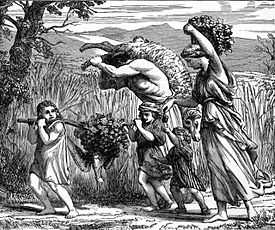
Deuteronomy chapter 6
The Gemara reported a number of Rabbis’ reports of how the Land of Israel did indeed flow with “milk and honey,” as described in Exodus 3:8 and 17, 13:5, and 33:3, Leviticus 20:24, Numbers 13:27 and 14:8, and Deuteronomy 6:3, 11:9, 26:9 and 15, 27:3, and 31:20. Once when Rami bar Ezekiel visited Bnei Brak, he saw goats grazing under fig trees while honey was flowing from the figs, and milk dripped from the goats mingling with the fig honey, causing him to remark that it was indeed a land flowing with milk and honey. Rabbi Jacob ben Dostai said that it is about three miles from Lod to Ono, and once he rose up early in the morning and waded all that way up to his ankles in fig honey. Resh Lakish said that he saw the flow of the milk and honey of Sepphoris extend over an area of sixteen miles by sixteen miles. Rabbah bar Bar Hana said that he saw the flow of the milk and honey in all the Land of Israel and the total area was equal to an area of twenty-two parasangs by six parasangs.[123]
The first three chapters of tractate Berakhot in the Mishnah, Jerusalem Talmud, and Babylonian Talmud and the first two chapters of tractate Berakhot in the Tosefta interpreted the laws of the Shema in Deuteronomy 6:4–9 and 11:13–21.[124]
Already at the time of the Mishnah, Deuteronomy 6:4–9 constituted the first part of a standard Shema prayer that the priests recited daily, followed by Deuteronomy 11:13–21 and Numbers 15:37–41.[125]
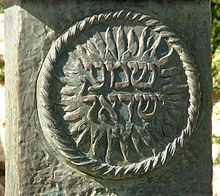
The Gemara explained that when Jews recite the Shema, they recite the words, “blessed be the name of God’s glorious Kingdom for ever and ever,” quietly between the words, “Hear, O Israel: the Lord our God, the Lord is one,” from Deuteronomy 6:4, and the words, “And you shall love the Lord your God with all your heart, and with all your soul, and with all your might,” from Deuteronomy 6:5, for the reason that Rabbi Simeon ben Lakish expounded when he explained what happened in Genesis 49:1. That verse reports, “And Jacob called to his sons, and said: ‘Gather yourselves together, that I may tell you what will befall you in the end of days.’” According to Rabbi Simeon, Jacob wished to reveal to his sons what would happen in the end of the days, but just then, the Shechinah departed from him. So Jacob said that perhaps, Heaven forfend, he had fathered a son who was unworthy to hear the prophecy, just as Abraham had fathered Ishmael or Isaac had fathered Esau. But his sons answered him (in the words of Deuteronomy 6:4), “Hear O Israel, the Lord our God, the Lord is One,” explaining that just as there was only One in Jacob’s heart, so there was only One in their hearts. And Jacob replied, “Blessed be the name of God’s glorious Kingdom for ever and ever.” The Rabbis considered that Jews might recite “Blessed be the name of God’s glorious Kingdom for ever and ever” aloud, but rejected that option, as Moses did not say those words in Deuteronomy 6:4–5. The Rabbis considered that Jews might not recite those words at all, but rejected that option, as Jacob did say the words. So the Rabbis ruled that Jews should recite the words quietly. Rabbi Isaac taught that the School of Rabbi Ammi said that one can compare this practice to that of a princess who smelled a spicy pudding. If she revealed her desire for the pudding, she would suffer disgrace; but if she concealed her desire, she would suffer deprivation. So her servants brought her pudding secretly. Rabbi Abbahu taught that the Sages ruled that Jews should recite the words aloud, so as not to allow heretics to claim that Jews were adding improper words to the Shema. But in Nehardea, where there were no heretics so far, they recited the words quietly.[126]
Rabbi Johanan considered twice daily recitation of the Shema (Deuteronomy 6:4–9) to fulfill the commandment of Joshua 1:8 that “this book of the law shall not depart out of your mouth, but you shall meditate therein day and night.” Rabbi Jose interpreted the analogous term “continually” (תָּמִיד, tamid) in Exodus 25:30, which says “And on the table you shall set the bread of display, to be before [God] continually.” Rabbi Jose taught that even if they took the old bread of display away in the morning and placed the new bread on the table only in the evening, they had honored the commandment to set the bread “continually.” Rabbi Ammi analogized from this teaching of Rabbi Jose that people who learn only one chapter of Torah in the morning and one chapter in the evening have nonetheless fulfilled the precept of Joshua 1:8 that “this book of the law shall not depart out of your mouth, but you shall meditate therein day and night.” And thus Rabbi Johanan said in the name of Rabbi Simeon ben Yohai that even people who read just the Shema morning and evening thereby fulfill the precept of Joshua 1:8. Rabbi Johanan taught that it is forbidden, however, to teach this to people who through ignorance are careless in the observance of the laws (as it might deter them from further Torah study). But Rava taught that it is meritorious to say it in their presence (as they might think that if merely reciting the Shema twice daily earns reward, how great would the reward be for devoting more time to Torah study).[127]
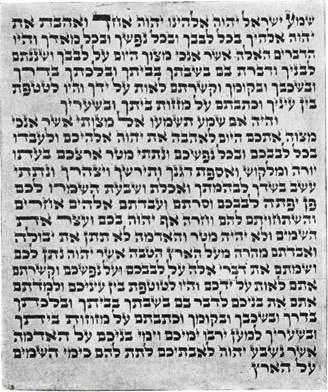
Abaye interpreted the words “and you shall love the Lord your God” in Deuteronomy 6:5 to teach that one should strive through one’s actions to cause others to love the Name of Heaven. So that if people see that those who study Torah and Mishnah are honest in business and speak pleasantly, then they will accord honor to the Name of God. But if people see that those who study Torah and Mishnah are dishonest in business and discourteous, then they will associate their shortcomings with their being Torah scholars.[128]
In Deuteronomy 6:5, the heart loves, and in Deuteronomy 6:6, the heart takes in words. A Midrash catalogued the wide range of additional capabilities of the heart reported in the Hebrew Bible.[129] The heart speaks,[130] sees,[131] hears,[132] walks,[133] falls,[134] stands,[135] rejoices,[136] cries,[137] is comforted,[138] is troubled,[139] becomes hardened,[140] grows faint,[141] grieves,[142] fears,[143] can be broken,[144] becomes proud,[145] rebels,[146] invents,[147] cavils,[148] overflows,[149] devises,[150] desires,[151] goes astray,[152] lusts,[153] is refreshed,[154] can be stolen,[155] is humbled,[156] is enticed,[157] errs,[158] trembles,[159] is awakened,[160] hates,[161] envies,[162] is searched,[163] is rent,[164] meditates,[165] is like a fire,[166] is like a stone,[167] turns in repentance,[168] becomes hot,[169] dies,[170] melts,[171] is susceptible to fear,[172] gives thanks,[173] covets,[174] becomes hard,[175] makes merry,[176] acts deceitfully,[177] speaks from out of itself,[178] loves bribes,[179] writes words,[180] plans,[181] receives commandments,[182] acts with pride,[183] makes arrangements,[184] and aggrandizes itself.[185]
Discussions of the laws of tefillin in Deuteronomy 6:8 appear at Mishnah Menachot 3:7[186] and Babylonian Talmud Zevachim 37b, Sanhedrin 4b, and Menachot 34b–37b.
Discussions of the laws of the mezuzah in Deuteronomy 6:9 appear at Babylonian Talmud Menachot 31b–34b.
In Leviticus 14:33–34, God announced that God would “put the plague of leprosy in a house of the land of your possession.” Rabbi Hiyya asked: Was it then a piece of good news that plagues were to come upon them? Rabbi Simeon ben Yohai answered that when the Canaanites heard that the Israelites were approaching, they hid their valuables in their houses. But God promised the Israelites’ forbearers that God would bring the Israelites into a land full of good things, including, in the words of Deuteronomy 6:11, “houses full of all good things.” So God brought plagues upon a house of one of the Israelites so that when he would pull it down, he would find a treasure.[187]
Noting that Deuteronomy 6:13 commands, “The Lord your God you shall fear and you shall serve,” and Leviticus 19:3 commands, “You shall fear your father and mother,” the Rabbis taught in a Baraita that Scripture likens the fear of parents to the fear of God. As Exodus 20:11 (20:12 in NJSP) commands, “Honor your father and your mother,” and Proverbs 3:9 directs, “Honor the Lord with your substance,” Scripture likens the honor due to parents to that due to God. And as Exodus 21:17 commands, “He that curses his father or his mother shall surely be put to death,” and Leviticus 24:15 commands, “Whoever curses his God shall bear his sin,” Scripture likens cursing parents to cursing God. But the Baraita conceded that with respect to striking (which Exodus 21:15 addresses with regard to parents), that it is certainly impossible (with respect to God). The Baraita concluded that these comparisons between parents and God are only logical, since the three (God, the mother, and the father) are partners in creation of the child. For the Rabbis taught in a Baraita that there are three partners in the creation of a person — God, the father, and the mother. When one honors one’s father and mother, God considers it as if God had dwelt among them and they had honored God. And a Tanna taught before Rav Nachman that when one vexes one’s father and mother, God considers it right not to dwell among them, for had God dwelt among them, they would have vexed God.[188]
Deuteronomy chapter 7
A Midrash expounded on why Israel was, in the words of Jeremiah 11:16, like “a leafy olive tree.” In one explanation, the Midrash taught that just as all liquids commingle one with the other, but oil refuses to do so, so Israel keeps itself distinct, as it is commanded in Deuteronomy 7:3.[189]
In medieval rabbinic interpretation
The parashah is discussed in these medieval rabbinic sources:

Deuteronomy chapter 5
Interpreting the prohibition of coveting in Exodus 20:13 (20:14 in NJSP) and desiring in Deuteronomy 5:17 (5:18 in the NJPS), Maimonides taught that any person who covets a servant, a maidservant, a house, or utensils that belong to a colleague, or any other article that the person can purchase from the colleague and pressures the colleague with friends and requests until the colleague agrees to sell, violates a negative commandment, even though the person pays much money for it, as Exodus 20:13 (20:14 in NJSP) says, “Do not covet.” Maimonides taught that the violation of this commandment was not punished by lashes, because it does not involve a deed. Maimonides taught that a person does not violate Exodus 20:13 (20:14 in NJSP) until the person actually takes the article that the person covets, as reflected by Deuteronomy 7:25: “Do not covet the gold and silver on these statues and take it for yourself.” Maimonides read the word for “covet” in both Exodus 20:13 (20:14 in NJSP) and Deuteronomy 7:25 to refer to coveting accompanied by a deed. Maimonides taught that a person who desires a home, a spouse, utensil, or anything else belonging to a colleague that the person can acquire violates a negative commandment when the person thinks in the person’s heart how it might be possible to acquire this thing from the colleague. Maimonides read Deuteronomy 5:17 (5:18 in the NJPS), “Do not desire,” to refer even to feelings in the heart alone. Thus, a person who desires another person’s property violates one negative commandment. A person who purchases an object the person desires after pressuring the owners and repeatedly asking them, violates two negative commandments. For that reason, Maimonides concluded, the Torah prohibits both desiring in Deuteronomy 5:17 (5:18 in the NJPS) and coveting in Exodus 20:13 (20:14 in NJSP). And if the person takes the article by robbery, the person violates three negative commandments.[190]
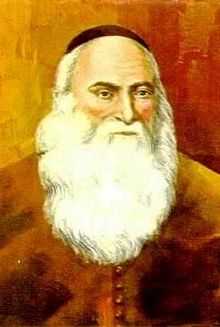
Isaac Abrabanel noted that the order of Exodus 20:13 (20:14 in NJSP), “You shall not covet your neighbor's house; you shall not covet your neighbor's wife,” differs from that in Deuteronomy 5:17 (5:18 in the NJPS), “Neither shall you covet thy neighbor's wife; neither shall you desire your neighbor's house.” Abrabanel deduced that Exodus 20:13 (20:14 in NJSP) mentions the things that might be coveted in the order that a person has need of them, and what it behooves a person to try to acquire in this world. Therefore, the first coveted item mentioned is a person’s house, then the person’s spouse, then the person’s servants, and lastly the person’s animals that do not speak. Deuteronomy 5:17 (5:18 in the NJPS), however, mentions them in the order of the gravity of the sin and evil. The most evil coveting is that of another person’s spouse, as in David’s coveting of Bathsheba. Next in magnitude of evil comes coveting the house in which one’s neighbor lives, lest the person evict the neighbor and take the neighbor’s home. Next comes the neighbor’s field, for although a person does not live there as in the house, it is the source of the neighbor’s livelihood and inheritance, as in the affair of Ahab and the vineyard of Naboth the Jezreelite. After the field Deuteronomy 5:17 (5:18 in the NJPS) mentions servants, who Abrabanel valued of lesser importance than one’s field. Next come the neighbor’s animals, who do not have the faculty of speech, and lastly, to include the neighbor’s inanimate moveable property, Deuteronomy 5:17 (5:18 in the NJPS) says “and anything that is your neighbor’s.”[191]
In modern interpretation

The parashah is discussed in these modern sources:
Deuteronomy chapter 4
Gunther Plaut argued that the discussions of cities of refuge in Deuteronomy 4:41–43 and 19:1–13 and Numbers 35:9–34 were composed during a later, settled period, in order to accommodate the disappearance of local altars that previously served as places of refuge.[192]
Commandments
According to Maimonides
Maimonides cited verses in the parashah for 11 positive and 15 negative commandments:[193]
- That warriors shall not fear their enemies nor be frightened of them in battle[194]
- To know that there exists God[195]
- Not to entertain the thought that there is any god but the Lord[196]
- Not to make a graven image, neither to make oneself nor to have made for oneself by others[197]
- Not to bow down to an object of idolatry, even if that is not its normal way of worship[198]
- Not to worship an object of idolatry in its normal ways of worship[199]
- Not to take an oath in vain[200]
- Not to do work on the Sabbath[201]
- To honor one's father and mother[202]
- Not to kill an innocent person[203]
- Not to kidnap any person of Israel; this is theft of a person.[204]
- Not to covet[205]

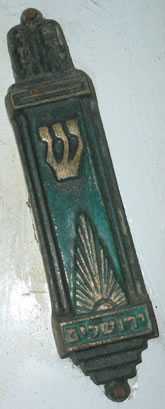
- Not to desire[206]
- To acknowledge God’s Oneness[207]
- To love God[208]
- To read the Shema twice daily[209]
- To learn Torah and teach it[210]
- To bind tefillin on the head[211]
- To bind tefillin on the arm[212]
- To fasten a mezuzah[213]
- To fear God[214]
- To swear by God’s Name[215]
- Not to test the word of God[216]
- Not to make a covenant with the seven Canaanite nations[217]
- Not to have mercy on idolaters[218]
- Not to intermarry with idolaters[219]
According to Sefer ha-Chinuch
According to Sefer ha-Chinuch, there are 8 positive and 4 negative commandments in the parashah.[220]
- Not to desire another’s possession[221]
- To know that God is one[222]
- To love God[223]
- To study Torah[224]
- To say the Shema twice daily[225]
- To bind tefillin on the arm[226]
- To wear tefillin on the head[227]
- To put a mezuzah on each door post[228]
- Not to test the prophet unduly[229]
- Not to make a covenant with idolaters[230]
- Not to show favor to them[231]
- Not to marry idolaters[232]
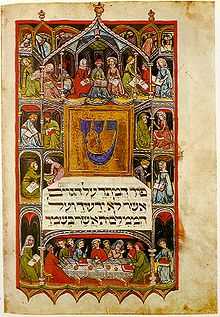
In the liturgy
The Torah reader and the congregation recite Deuteronomy 4:4 immediately before the Torah reading, signifying how learning the Torah embodies remaining steadfast to God.[233]
The Passover Haggadah, in the magid section of the Seder, quotes Deuteronomy 4:34 to elucidate the term “great terribleness” in Deuteronomy 26:8, interpreting the “great terribleness” to mean the revelation of the Shechinah or Divine Presence.[234]
The Lekhah Dodi liturgical poem of the Kabbalat Shabbat prayer service quotes both the commandment of Exodus 20:7 (Exodus 20:8 in the NJPS) to “remember” the Sabbath and the commandment of Deuteronomy 5:11 (Deuteronomy 5:12 in NJPS) to “keep” or “observe” the Sabbath, saying that they “were uttered as one by our Creator.”[235]
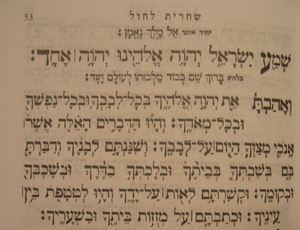
The verses of the Shema and V'ahavta in Deuteronomy 6:4–9 constitute a central prayer in Jewish prayer services. Jews combine Deuteronomy 6:4–9 along with Deuteronomy 11:13–21, and Numbers 15:37–41 to form the core of K’riat Shema, recited in the evening (Ma’ariv) and morning (Shacharit) prayer services.[236] A shorter version of the Shema, composed of simply Deuteronomy 6:4, appears in the Torah service (Seder K’riat HaTorah) and the Kedushah of the Musaf service for Shabbat.[237] And the Shema and for some the V'ahavta, Deuteronomy 6:4–9, are among the first prayers said upon arising and form the central prayer of the bedtime Shema, said just before retiring for sleep.[238]
Reuven Hammer noted that Mishnah Tamid 5:1[239] recorded what was in effect the first siddur, as a part of which priests daily recited the Ten Commandments and Deuteronomy 6:4–9.[240]
The commandment to love God in Deuteronomy 6:5 is reflected in Psalm 97:10, which is in turn one of the six Psalms recited at the beginning of the Kabbalat Shabbat prayer service.[241]
The “love” of God that Deuteronomy 6:5 urges finds reflection in the characterization of God as the “Beloved” in the Lekhah Dodi liturgical poem of the Kabbalat Shabbat prayer service.[242]
And the leshem yihud prayer before putting on tefillin quotes the commandment of Deuteronomy 6:8.[243]
In the magid section, the Haggadah combines Deuteronomy 6:21 and 5:14 in the first answer to the Four Questions (Ma Nishtana) in the magid section of the Seder.[244] And shortly thereafter, the Haggadah quotes Deuteronomy 6:20 to provide the question of the wise son, also in the magid section.[245]
Also in the magid section, the Haggadah quotes Deuteronomy 6:23 — emphasizing the word “us” (otanu) — for the proposition that God did not redeem the ancestral Israelites alone, but also the current generation of Jews with them.[246]
The Weekly Maqam
In the Weekly Maqam, Sephardi Jews each week base the songs of the services on the content of that week's parashah. For Parashah Va'etchanan, Sephardi Jews apply Maqam Hoseni, the maqam that expresses beauty. This is especially appropriate in this parashah because it is the parashah where Moses repeats to the Israelites their history of receiving the Ten Commandments.
.jpg)
Haftarah
The parashah is always read on the special Sabbath Shabbat Nachamu, the Sabbath immediately after Tisha B'Av. Shabbat Nachamu (“Sabbath of comfort”) takes its name from the first word of the haftarah for the parashah, Isaiah 40:1–26, which speaks of "comforting" the Jewish people for their suffering — נַחֲמוּ נַחֲמוּ, עַמִּי, nachamu nachamu, ami, "Be comforted, be comforted, My nation...." The haftarah is the first in the cycle of seven haftarot of consolation after Tisha B'Av, leading up to Rosh Hashanah.
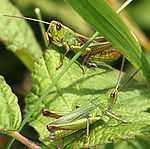
Summary
God told the prophet to comfort God’s people and bid Jerusalem to take heart, as the city’s guilt had been paid off.[247] A voice in the wilderness called to clear the way and make a highway for God, for every valley will be lifted up, every mountain will be made low, and God’s glory will be revealed to all.[248] A voice proclaimed that all flesh is grass, its goodness like a flower of the field, which withers and fades; but God’s word will stand forever.[249] The herald of good tidings should go to the mountain and announce to the cities of Judah that God will come as a Mighty One to rule, as a shepherd that feeds the flock, gathers the lambs, carries them, and gently leads them.[250]
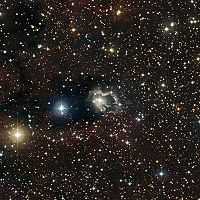
Who has held the waters in hand, measured the heavens, comprehended the earth, and weighed mountains in the balance?[251] Who has counseled or instructed God?[252] Nations are like a drop in a bucket, like dust in the balance, as nothing before God.[253] Can one compare God to anything, to an idol that a woodworker carved?[254] God sits above the earth, and its inhabitants are like grasshoppers.[255] God brings princes to nothing, makes the judges of the earth like nothing; scarcely are they planted, but God blows upon them, and they wither and blow away.[256]
To whom then to liken God? Lift up your eyes and see: The One who created the stars, called them by name, by the greatness of God’s might and strong power each one appears.[257]
Connection to the Special Sabbath
The haftarah answers laments read on Tisha B'Av from the book of Lamentations. Lamentations 1:2 and 9 complain that Jerusalem “has none to comfort her,” “she has no comforter.” In Isaiah 40:1, the haftarah answers, “Comfort, comfort My people, says your God.” Lamentations 1:4 complains that “the ways of Zion mourn.” In Isaiah 40:3, the haftarah answers, “Clear in the wilderness the way of the Lord, make plain in the desert a highway for our God.” Lamentations 1:6 complains that Zion’s princes “are gone without strength before the pursuer.” In Isaiah 40:9 and 26, the haftarah answers, “lift up your voice with strength,” God “is strong in power.” Lamentations 4:22 hoped for Jerusalem that “the punishment of your iniquity is accomplished” and God “will no more carry you away into captivity.” In Isaiah 40:2, the haftarah affirms, “Bid Jerusalem take heart, and proclaim to her, that her time of service is accomplished, that her guilt is paid off.”
As well, the haftarah echoes the parashah. In the parashah in Deuteronomy 3:25, Moses pleads, “Let me go over, I pray, and see the good land that is beyond the Jordan, that goodly hill-country, and Lebanon.” As if in answer, the haftarah rejoins in Isaiah 40:15–16, “the nations are as a drop of a bucket, . . . and Lebanon is not sufficient fuel, nor the beasts thereof sufficient for burnt-offerings.”
Further reading
The parashah has parallels or is discussed in these sources:

Ancient
- Code of Hammurabi Epilogue reverse 25, lines 60–73. Babylonia, Circa 1780 BCE. Reprinted in, e.g., James B. Pritchard. Ancient Near Eastern Texts Relating to the Old Testament, page 178. Princeton: Princeton University Press, 1969. ISBN 0-691-03503-2. (not to change the law).
- Book of the Dead, chapter 125. Ancient Egypt, 1500–1400 BCE. Reprinted in, e.g., E. A. Wallis Budge. The Egyptian Book of the Dead (The Papyrus of Ani) Egyptian Text, Transliteration and Translation, pages 195–205. New York: Dover Publications, 1967. (analog to Ten Commandments).
Biblical
- Exodus 13:1–2 (firstborn); 13:12–13 (firstborn); 20:4; 20:5 in NJPS (punishing children for fathers’ sin); 20:1–19 (Ten Commandments); 21:12–14 (cities of refuge); 22:28–29 (firstborn); 34:7 (punishing children for fathers’ sin).
- Numbers 3:11–13 (firstborn); 14:18 (punishing children for fathers’ sin); 18:15–18 (firstborn); 35:1–33.
- Deuteronomy 17:2–5 (worshipping sun, moon, stars); 19:1–13; 24:16 (no capital punishment of children for fathers’ sin).
- Joshua 20:1–9 (cities of refuge).
- Isaiah 56:6–7 (keeping the Sabbath); 66:23 (universally observed Sabbath).
- Jeremiah 8:1–2 (worshipping sun, moon, stars); 31:28–29, (31:29–30 in NJPS) (not punishing children for fathers’ sin).
- Ezekiel 8:16–18 (sun worship); 18:1–4 (not punishing children for fathers’ sin); 18:5–7 (the just one does not rob).
- Psalms 19:8–12 (value of God’s law); 71:19 (God’s righteousness reaches to heaven); 86:8 (none like God among the gods); 89:6 (heavens praise God in the assembly of the holy ones); 111:10 (fear of the Lord is the beginning of wisdom).
- Job 31:26–28 (worshipping sun, moon).
Early nonrabbinic

- Matthew 22:34–40. Circa 70–100 CE. (Shema).
- Luke 10:25–28. Circa 80–150 CE. (Shema).
- Josephus, Antiquities of the Jews 4:8:2, 13 Circa 93–94. Reprinted in, e.g., The Works of Josephus: Complete and Unabridged, New Updated Edition. Translated by William Whiston. Peabody, Massachusetts: Hendrickson Publishers, 1987. ISBN 0-913573-86-8.
Classical rabbinic
- Mishnah: Berakhot 1:1–3:6; 9:5; Orlah 1:7; Shabbat 1:1–24:5; Sotah 7:1, 8; Kiddushin 1:7; Bava Kamma 5:7; Sanhedrin 2:4; 9:1–6; Makkot 2:1–8; Avodah Zarah 1:1–5:12; Avot 3:8; Zevachim 8:10; Menachot 3:7; Tamid 5:1. Land of Israel, circa 200 CE. Reprinted in, e.g., The Mishnah: A New Translation. Translated by Jacob Neusner, pages 3–14, 160, 179–208, 457, 459, 488, 515, 586, 602–04, 612–16, 660–72, 679, 717, 739–40, 869. New Haven: Yale University Press, 1988. ISBN 0-300-05022-4.
- Tosefta: Berakhot 1:1–3:1, 6:1; Maaser Sheni 5:28; Shekalim 2:2; Rosh Hashanah 2:13; Chagigah 2:7; Sotah 7:7, 17, 8:10; Bava Kamma 6:18, 7:9; Sanhedrin 4:7; Makkot 2:1–3:10; Avodah Zarah 1:16, 3:15; Zevachim 8:23. Land of Israel, circa 300 CE. Reprinted in, e.g., The Tosefta: Translated from the Hebrew, with a New Introduction. Translated by Jacob Neusner. Peabody, Massachusetts: Hendrickson Publishers, 2002. ISBN 1-56563-642-2.
- Sifre to Deuteronomy 26:1–36:4. Land of Israel, circa 250–350 CE. Reprinted in, e.g., Sifre to Deuteronomy: An Analytical Translation. Translated by Jacob Neusner, volume 1, pages 67–104. Atlanta: Scholars Press, 1987. ISBN 1-55540-145-7.
- Jerusalem Talmud: Berakhot 1a–42b, 53a, 54a, 72b, 86b–88a, 92b, 93b; Peah 6b–7a; Sheviit 46b; Terumot 7a; Shabbat 1a–; Pesachim 84b; Yoma 5b, 9a; Rosh Hashanah 9b; Megillah 8a, 14a, 15b, 22a, 25a, 33b; Makkot ch. 2; Avodah Zarah 1a–. Land of Israel, circa 400 CE. Reprinted in, e.g., Talmud Yerushalmi. Edited by Chaim Malinowitz, Yisroel Simcha Schorr, and Mordechai Marcus, volumes 1–3, 6b–7, 19, 21, 24, 26. Brooklyn: Mesorah Publications, 2005–2013.
- Genesis Rabbah 1:10; 7:2; 8:1, 9; 15:1; 16:2–3, 5; 20:7; 21:1, 3, 5, 9; 24:2; 38:6; 39:11; 44:9, 20, 23; 55:3; 68:12; 84:15. Land of Israel, 5th century. Reprinted in, e.g., Midrash Rabbah: Genesis. Translated by H. Freedman and Maurice Simon, volume 1, pages 9, 50–51, 54–55, 60, 119, 125–27, 130, 166, 172, 174–75, 178, 199, 304–05, 319, 374–75, 377, 483-84; volume 2, pages 625, 739–40, 808, 893, 912, 1002. London: Soncino Press, 1939. ISBN 0-900689-38-2.

- Babylonian Talmud: Berakhot 2a–6a, 30b, 32a–b, 48b, 54a, 61b; Shabbat 9b, 10b, 32b, 33b, 51b, 56b, 75a, 78b, 79b, 87a–b, 103b, 132a; Eruvin 13a, 22a, 48a, 92b, 95b; Pesachim 22b, 25a, 55a, 56a; Yoma 10a, 11a, 19b, 33b, 72b, 82a, 86a; Sukkah 3a–b, 10b, 25a–b, 41b–42a, 53b; Beitzah 5a; Rosh Hashanah 18a–b, 27a, 28b, 32b; Taanit 9a; Megillah 9a–b, 11a, 17b, 20a, 21a, 24b, 31b; Moed Katan 7b, 15a–b, 18b, 21b; Chagigah 3a, 9b, 11b–12a; Yevamot 6b, 17a, 23a, 48b, 49b, 62a, 76a, 78b, 105a, 109b; Ketubot 111b; Nedarim 8a, 37a, 38a, 62b; Sotah 5a, 10b, 13b, 31a, 32b, 49a; Gittin 12a, 45b, 56b, 57b, 88a; Kiddushin 29a–30b, 34a, 39b–40a, 57a, 58a, 68b; Bava Kamma 41b, 54b–55a, 67b, 79b, 87a, 92b, 102b; Bava Metzia 16b, 35a, 89a, 108a; Bava Batra 110a; Sanhedrin 4b, 17a, 21b–22a, 29a, 38a–b, 56a–57a, 59b, 64a, 67b, 74a, 78b–79a; Makkot 9b–10a, 11b, 12b–13a; Shevuot 20b, 36a; Avodah Zarah 2b–3a, 4b–5a, 7b, 11a, 20a, 23b, 25a, 36b, 45b, 54b, 58b; Zevachim 19a, 37b, 80a; Menachot 28a, 31b–37b, 42b, 43b–44a, 53b, 71a, 99b; Chullin 7b, 17a, 23a, 89a, 91b, 119b, 141a, 142a; Bekhorot 29a, 57a; Arakhin 3b; Temurah 3b–4a, 28b. Babylonia, 6th century. Reprinted in, e.g., Talmud Bavli. Edited by Yisroel Simcha Schorr, Chaim Malinowitz, and Mordechai Marcus, 72 volumes. Brooklyn: Mesorah Pubs., 2006.
- Deuteronomy Rabbah 2:1–37. Land of Israel, 9th century. Reprinted in, e.g., Midrash Rabbah: Deuteronomy. Translated by H. Freedman and Maurice Simon. London: Soncino Press, 1939. ISBN 0-900689-38-2.

Medieval
- Solomon ibn Gabirol. A Crown for the King, 2 (“You are one”). Spain, 11th century. Translated by David R. Slavitt, pages 4–6. New York: Oxford University Press, 1998. ISBN 0-19-511962-2.
- Rashi. Commentary. Deuteronomy 3–7. Troyes, France, late 11th century. Reprinted in, e.g., Rashi. The Torah: With Rashi’s Commentary Translated, Annotated, and Elucidated. Translated and annotated by Yisrael Isser Zvi Herczeg, volume 5, pages 45–81. Brooklyn: Mesorah Publications, 1997. ISBN 0-89906-030-7.

- Judah Halevi. Kuzari. 1:87–91; 2:34, 50; 3:31, 35, 39–41; 4:3; 5:23. Toledo, Spain, 1130–1140. Reprinted in, e.g., Jehuda Halevi. Kuzari: An Argument for the Faith of Israel. Introduction by Henry Slonimsky, pages 21, 60–63, 108, 114, 165, 168, 172–73, 205, 293. New York: Schocken, 1964. ISBN 0-8052-0075-4.
- Numbers Rabbah 23:13. 12th century. Reprinted in, e.g., Midrash Rabbah: Numbers. Translated by Judah J. Slotki. London: Soncino Press, 1939. ISBN 0-900689-38-2.
- Maimonides. The Guide for the Perplexed, Introduction; part 1, chapters 3, 18, 30, 36–37, 39, 42–43; part 2, chapters 5, 11, 30–31, 33, 39; part 3, chapters 9, 26–27, 29, 31–33, 39, 41, 48, 51–53. Cairo, Egypt, 1190. Reprinted in, e.g., Moses Maimonides. The Guide for the Perplexed. Translated by Michael Friedländer, pages 3, 16–17, 28, 40, 50–51, 53–55, 57, 159, 168, 213, 219, 221–22, 231–32, 265, 310, 313, 320–21, 323, 325, 327, 339, 341, 345, 379, 386–87, 392–93. New York: Dover Publications, 1956. ISBN 0-486-20351-4.
- Hezekiah ben Manoah. Hizkuni. France, circa 1240. Reprinted in, e.g., Chizkiyahu ben Manoach. Chizkuni: Torah Commentary. Translated and annotated by Eliyahu Munk, volume 4, pages 1061–82. Jerusalem: Ktav Publishers, 2013. ISBN 1602-802-612.

- Zohar 3:260a–270a. Spain, late 13th century. Reprinted in, e.g., The Zohar. Translated by Harry Sperling and Maurice Simon. 5 volumes. London: Soncino Press, 1934.
- Meister Eckhart. “Sermon 2 (LW XXIX): ‘God is one’”; “Sermon 3 (XL, 3): ‘What do you think of Christ? Whose son is he?’” Early 14th Century. Reprinted in, e.g., Meister Eckhart. Selected Writings. Translated by Oliver Davies, pages 258–64. London: Penguin Books, 1994. ISBN 0140433430. (Deuteronomy 6:4–5).
- Isaac ben Moses Arama. Akedat Yizhak (The Binding of Isaac). Late 15th century. Reprinted in, e.g., Yitzchak Arama. Akeydat Yitzchak: Commentary of Rabbi Yitzchak Arama on the Torah. Translated and condensed by Eliyahu Munk, volume 2, pages 801–21. New York, Lambda Publishers, 2001. ISBN 965-7108-30-6.
Modern
- Obadiah ben Jacob Sforno. Commentary on the Torah. Venice, 1567. Reprinted in, e.g., Sforno: Commentary on the Torah. Translation and explanatory notes by Raphael Pelcovitz, pages 846–69. Brooklyn: Mesorah Publications, 1997. ISBN 0-89906-268-7.
- Moshe Alshich. Commentary on the Torah. Safed, circa 1593. Reprinted in, e.g., Moshe Alshich. Midrash of Rabbi Moshe Alshich on the Torah. Translated and annotated by Eliyahu Munk, volume 3, pages 960–92. New York, Lambda Publishers, 2000. ISBN 965-7108-13-6.
.jpg)
- Avraham Yehoshua Heschel. Commentaries on the Torah. Cracow, Poland, mid 17th century. Compiled as Chanukat HaTorah. Edited by Chanoch Henoch Erzohn. Piotrkow, Poland, 1900. Reprinted in Avraham Yehoshua Heschel. Chanukas HaTorah: Mystical Insights of Rav Avraham Yehoshua Heschel on Chumash. Translated by Avraham Peretz Friedman, pages 297–303. Southfield, Michigan: Targum Press/Feldheim Publishers, 2004. ISBN 1-56871-303-7.
- Thomas Hobbes. Leviathan, 3:42; 4:45. England, 1651. Reprint edited by C. B. Macpherson, pages 545–47, 672, 676. Harmondsworth, England: Penguin Classics, 1982. ISBN 0-14-043195-0.
- Chaim ibn Attar. Ohr ha-Chaim. Venice, 1742. Reprinted in Chayim ben Attar. Or Hachayim: Commentary on the Torah. Translated by Eliyahu Munk, volume 5, pages 1775–817. Brooklyn: Lambda Publishers, 1999. ISBN 965-7108-12-8.
- Moses Mendelssohn. Jerusalem, § 2. Berlin, 1783. Reprinted in Jerusalem: Or on Religious Power and Judaism. Translated by Allan Arkush; introduction and commentary by Alexander Altmann, pages 100, 119. Hanover, N.H.: Brandeis Univ. Press, 1983. ISBN 0-87451-264-6.

- Samson Raphael Hirsch. Horeb: A Philosophy of Jewish Laws and Observances. Translated by Isidore Grunfeld, pages 5–8, 12–13, 18–35, 43–46, 61–78, 102–09, 117–21, 175–80, 187–89, 217–22, 274, 298–302, 359–66, 369–74, 378–81, 406–16, 441–43, 448–52, 478, 514, 544, 565–68. London: Soncino Press, 1962. Reprinted 2002 ISBN 0-900689-40-4. Originally published as Horeb, Versuche über Jissroel’s Pflichten in der Zerstreuung. Germany, 1837.
- Samson Raphael Hirsch. The Jewish Sabbath. Nabu Press, 2010. Originally published Germany, 19th Century.
.jpg)
- Emily Dickinson. Poem 112 (Where bells no more affright the morn —). Circa 1859. Poem 168 (If the foolish, call them "flowers" —). Circa 1860. Poem 564 (My period had come for Prayer —). Circa 1862. Poem 597 (It always felt to me — a wrong). Circa 1862. Poem 1260 (Because that you are going). Circa 1873. Poem 1591 (The Bobolink is gone —). Circa 1883. Poem 1719 (God is indeed a jealous God —). 19th century. Poem 1733 (No man saw awe, nor to his house). 19th century. In The Complete Poems of Emily Dickinson. Edited by Thomas H. Johnson, pages 53, 79–80, 274–75, 293–94, 551–52, 659, 698, 703. New York: Little, Brown & Co., 1960. ISBN 0-316-18414-4.
- David Clarkson. “Soul Idolatry Excludes Men from Heaven.” In The Practical Works of David Clarkson, Volume II, pages 299ff. Edinburgh: James Nichol, 1865. Reprinted in David Clarkson. Soul Idolatry Excludes Men Out of Heaven. Curiosmith, 2010. ISBN 1935626167.
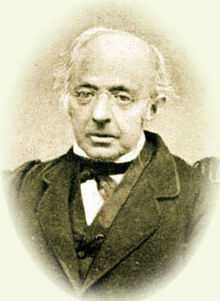
- Samuel David Luzzatto (Shadal). Commentary on the Torah. Padua, 1871. Reprinted in, e.g., Samuel David Luzzatto. Torah Commentary. Translated and annotated by Eliyahu Munk, volume 4, pages 1160–73. New York: Lambda Publishers, 2012. ISBN 965-524-067-3.
- Yehudah Aryeh Leib Alter. Sefat Emet. Góra Kalwaria (Ger), Poland, before 1906. Excerpted in The Language of Truth: The Torah Commentary of Sefat Emet. Translated and interpreted by Arthur Green, pages 289–93. Philadelphia: Jewish Publication Society, 1998. ISBN 0-8276-0650-8. Reprinted 2012. ISBN 0-8276-0946-9.
- Abraham Isaac Kook. The Moral Principles. Early 20th century. Reprinted in Abraham Isaac Kook: the Lights of Penitence, the Moral Principles, Lights of Holiness, Essays, Letters, and Poems. Translated by Ben Zion Bokser, pages 156, 176. Mahwah, N.J.: Paulist Press 1978. ISBN 0-8091-2159-X.
- Thomas Mann. Joseph and His Brothers. Translated by John E. Woods, pages 325, 447, 612, 788. New York: Alfred A. Knopf, 2005. ISBN 1-4000-4001-9. Originally published as Joseph und seine Brüder. Stockholm: Bermann-Fischer Verlag, 1943.
- Thomas Mann, Rebecca West, Franz Werfel, John Erskine, Bruno Frank, Jules Romains, André Maurois, Sigrid Undset, Hendrik Willem van Loon, Louis Bromfield, Herman Rauchning. The Ten Commandments: Ten Short Novels of Hitler's War Against the Moral Code. Edited by Armin L. Robinson. New York: Simon and Schuster, 1943.

- Abraham Joshua Heschel. The Sabbath. New York: Farrar Straus Giroux, 1951. Reprinted 2005. ISBN 0-374-52975-2.
- Abraham Joshua Heschel. Man's Quest for God: Studies in Prayer and Symbolism, pages 36, 120. New York: Charles Scribner’s Sons, 1954.
- Morris Adler. The World of the Talmud, pages 26, 28–29, 76, 89–90. B'nai B'rith Hillel Foundations, 1958. Reprinted Kessinger Publishing, 2007. ISBN 0-548-08000-3.
- Johann J. Stamm and Maurice E. Andrew. The Ten Commandments in Recent Research. Naperville, Illinois: Alec R. Allenson, 1967.

- Martin Buber. On the Bible: Eighteen studies, pages 80–121. New York: Schocken Books, 1968.
- Anthony Phillips. Ancient Israel's Criminal Law: A New Approach to the Decalogue. Oxford: Basil Blackwell, 1970. ISBN 0-631-12280-X.
- Hermann Cohen. Religion of Reason: Out of the Sources of Judaism, page 76. New York: F. Ungar Publishing Company, 1972. ISBN 0-8044-5229-6.
- W. Gunther Plaut. Shabbat Manual. New York: CCAR, 1972.
- Walter J. Harrelson. The Ten Commandments and Human Rights. Philadelphia: Fortress Press, 1980. ISBN 0-8006-1527-1. Revised ed. Mercer Univ. Press, 1997. ISBN 0-86554-542-1.
- Patrick D. Miller Jr. “The Many Faces of Moses: A Deuteronomic portrait.” Bible Review, volume 4 (number 5) (October 1988).
- David Noel Freedman. “The Nine Commandments: The secret progress of Israel’s sins.” Bible Review, volume 5 (number 6) (December 1989).
- Krzysztof Kieślowski. The Decalogue. Warsaw: Sender Freies Berlin (SFB), Telewizja Polska (TVP), and Zespol Filmowy “Tor,” 1989.
- Pinchas Hacohen Peli. The Jewish Sabbath: A Renewed Encounter. New York: Schocken, 1991. ISBN 0-8052-0998-0.
- Moshe Weinfeld. Deuteronomy 1–11, volume 5, pages 189–384. New York: Anchor Bible, 1991. ISBN 0-385-17593-0.
- Moshe Weinfeld. “What Makes the Ten Commandments Different?” Bible Review, volume 7 (number 2) (April 1991).
- Moshe Halbertal and Avishai Margalit. Idolatry. Translated by Naomi Goldblum. Cambridge, Massachusetts: Harvard University Press, 1992. ISBN 0674443128.
- Lawrence Kushner. God Was in This Place and I, I Did Not Know: Finding Self, Spirituality and Ultimate Meaning, pages 39–40. Jewish Lights Publishing, 1993. ISBN 1-879045-33-8. (between God and you).
- Aaron Wildavsky. Assimilation versus Separation: Joseph the Administrator and the Politics of Religion in Biblical Israel, page 3. New Brunswick, New Jersey: Transaction Publishers, 1993. ISBN 1-56000-081-3.
- Sandy Eisenberg Sasso. "In God's Name". Woodstock, Vermont: Jewish Lights Publishing, 1994. ISBN 1-879045-26-5. (calling God One).
- Ronald Youngblood. “Counting the Ten Commandments.” Bible Review, volume 10 (number 6) (December 1994).
- Judith S. Antonelli. “The Prohibition of Imagery.” In In the Image of God: A Feminist Commentary on the Torah, pages 407–15. Northvale, New Jersey: Jason Aronson, 1995. ISBN 1-56821-438-3.
- Mark Dov Shapiro. Gates of Shabbat: A Guide for Observing Shabbat. New York: CCAR Press, 1996. ISBN 0-88123-010-3.
- Moshe Weinfeld. “Deuteronomy’s Theological Revolution.” Bible Review, volume 12 (number 1) (February 1996).
- Jeffrey H. Tigay. The JPS Torah Commentary: Deuteronomy: The Traditional Hebrew Text with the New JPS Translation, pages 38–88, 432–44. Philadelphia: Jewish Publication Society, 1996. ISBN 0-8276-0330-4.
- Sorel Goldberg Loeb and Barbara Binder Kadden. Teaching Torah: A Treasury of Insights and Activities, pages 299–303. Denver: A.R.E. Publishing, 1997. ISBN 0-86705-041-1.
- Baruch J. Schwartz. “What Really Happened at Mount Sinai? Four biblical answers to one question.” Bible Review, volume 13 (number 5) (October 1997).
- William H.C. Propp. “Why Moses Could Not Enter The Promised Land.” Bible Review, volume 14 (number 3) (June 1998).
- David Noel Freedman. The Nine Commandments: Uncovering a Hidden Pattern of Crime and Punishment in the Hebrew Bible. New York: Doubleday, 2000. ISBN 0-385-49986-8.
- Rochelle Robins. “‘A Land Flowing with Milk and Honey’: Sexualizing the Land.” In The Women's Torah Commentary: New Insights from Women Rabbis on the 54 Weekly Torah Portions. Edited by Elyse Goldstein, pages 338–44. Woodstock, Vermont: Jewish Lights Publishing, 2000. ISBN 1-58023-076-8.
- Reuven Hammer. Or Hadash: A Commentary on Siddur Sim Shalom for Shabbat and Festivals, page 30. New York: The Rabbinical Assembly, 2003. ISBN 0-916219-20-8. (mezuzah).
- Joseph Telushkin. The Ten Commandments of Character: Essential Advice for Living an Honorable, Ethical, Honest Life, pages 52–59, 61–65, 76–80, 129–32, 177–80, 189–90, 204–06, 275–78. New York: Bell Tower, 2003. ISBN 1-4000-4509-6.
- Bernard M. Levinson. “Deuteronomy.” In The Jewish Study Bible. Edited by Adele Berlin and Marc Zvi Brettler, pages 370–83. New York: Oxford University Press, 2004. ISBN 0-19-529751-2.
- W. Gunther Plaut. The Torah: A Modern Commentary: Revised Edition. Revised edition edited by David E.S. Stern, pages 1184–225. New York: Union for Reform Judaism, 2006. ISBN 0-8074-0883-2.
- Suzanne A. Brody. “Shabbat” and “Intermarriage.” In Dancing in the White Spaces: The Yearly Torah Cycle and More Poems, pages 51–57, 103. Shelbyville, Kentucky: Wasteland Press, 2007. ISBN 1-60047-112-9.
- Esther Jungreis. Life Is a Test, pages 86–89, 116–19, 147–48, 154, 163, 166, 169, 219, 248–49, 257–58, 266. Brooklyn: Shaar Press, 2007. ISBN 1-4226-0609-0.
- The Torah: A Women's Commentary. Edited by Tamara Cohn Eskenazi and Andrea L. Weiss, pages 1063–88. New York: URJ Press, 2008. ISBN 0-8074-1081-0.
- Ziv Hellman. “And on the Seventh Day: Israelis ponder the public nature of the Shabbath in a state that seeks to be both Jewish and democratic.” The Jerusalem Report, volume 20 (number 19) (January 4, 2009): pages 26–30.
- Timothy Keller. Counterfeit Gods: The Empty Promises of Money, Sex, and Power, and the Only Hope that Matters. Dutton Adult, 2009. ISBN 0525951369. (What is an idol? It is anything more important to you than God, anything that absorbs your heart and imagination more than God, anything you seek to give you what only God can give.).
- Frank Newport. “Extramarital Affairs, Like Sanford’s, Morally Taboo: Recent Confessions of Affairs by Elected Officials Fly in Face of Americans’ Normative Standards” Gallup Inc. June 25, 2009.
- Julie Cadwallader-Staub. Joy. In Face to Face: A Poetry Collection. DreamSeeker Books, 2010. ISBN 193103852X. (“land of milk and honey”).
- Joseph Telushkin. Hillel: If Not Now, When? pages 55–57. New York: Nextbook, Schocken, 2010. ISBN 978-0-8052-4281-2. (honoring father and mother).
- “Day of Rest: Judith Shulevitz’s New Book Considers the Sabbath Throughout the Ages and in Her Own Life.” In Tablet Magazine. (March 15, 2010).

- “Body Image: An Art Historian Tackles the Thorny Matter of Jews and Figurative Painting.” In Tablet Magazine. (June 7, 2010). (the commandment not to make graven images and Jewish artists).
- Joe Lieberman and David Klinghoffer. The Gift of Rest: Rediscovering the Beauty of the Sabbath. New York: Howard Books, 2011. ISBN 1-4516-0617-6.
- United Nations Office on Drugs and Crime. Global Study on Homicide. Vienna, 2011.

- Shmuel Herzfeld. “Did Moshe Sin?” In Fifty-Four Pick Up: Fifteen-Minute Inspirational Torah Lessons, pages 257–61. Jerusalem: Gefen Publishing House, 2012. ISBN 978-965-229-558-3.
- Adam Kirsch. “Ancient Laws for Modern Times: When is a tent just a tent and not like a bed or a hat? To update Jewish laws, the rabbis reasoned by analogy.” Tablet Magazine. (February 26, 2013). (Shabbat).
- Adam Kirsch. “Leave the Jewish People Alone: Rabbis left enforcement of their Talmudic decrees to communal standards and voluntary commitment.” Tablet Magazine. (March 5, 2013). (Shabbat).
- Adam Kirsch. “Written in the Stars (Or Not): To overcome fated lives, the Talmud’s rabbis argued, perform virtuous acts according to Torah.” Tablet Magazine. (March 12, 2013). (Shabbat).
- Adam Kirsch. “Navigating the Talmud’s Alleys: The range of problems and the variety of answers in the study of Oral Law lead to new pathways of reasoning.” Tablet Magazine. (March 18, 2013). (Shabbat).
- Noah Wiener. “The Shema‘ Yisrael: Monotheistic Jewish Amulet Discovered Near Carnuntum.” Bible History Daily (blog of Biblical Archaeology Review). (April 12, 2013).
- Leon R. Kass. “The Ten Commandments: Why the Decalogue Matters.” Mosaic Magazine. (June 2013).
- Peter Berkowitz. “The Decalogue and Liberal Democracy: Response to: ‘The Ten Commandments.’” Mosaic Magazine. (June 2013).
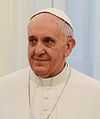
- Haim O. Rechnitzer. “Unconditional Love: Distinguishing between the love of God and the love of country.” The Jerusalem Report, volume 24 (number 8) (July 10, 2013): page 47.
- Amiel Ungar. “Tel Aviv and the Sabbath.” The Jerusalem Report, volume 24 (number 8) (July 29, 2013): page 37.
- Pope Francis. “No to the new idolatry of money.” In Evangelii gaudium (The Joy of the Gospel). Vatican City: The Holy See, 2013.
External links

Texts
Commentaries
Notes
- ↑ "Devarim Torah Stats". Akhlah Inc. Retrieved July 6, 2013.
- ↑ See, e.g., The Schottenstein Edition Interlinear Chumash: Devarim / Deuteronomy. Edited by Menachem Davis, pages 26–53. Brooklyn: Mesorah Publications, 2009. ISBN 1-4226-0210-9.
- ↑ Deuteronomy 3:23–25.
- ↑ Deuteronomy 3:26.
- ↑ Deuteronomy 3:27.
- ↑ Deuteronomy 3:28.
- ↑ See, e.g., The Schottenstein Edition Interlinear Chumash, page 27.
- ↑ Deuteronomy 4:1–2.
- ↑ Deuteronomy 4:3–4.
- ↑ See, e.g., The Schottenstein Edition Interlinear Chumash, page 28.
- ↑ Deuteronomy 4:6–8.
- ↑ Deuteronomy 4:9–13.
- ↑ Deuteronomy 4:14.
- ↑ Deuteronomy 4:15–18.
- ↑ Deuteronomy 4:19–20.
- ↑ Deuteronomy 4:21–22.
- ↑ Deuteronomy 4:23–24.
- ↑ See, e.g., The Schottenstein Edition Interlinear Chumash, page 33.
- ↑ Deuteronomy 4:25–27.
- ↑ Deuteronomy 4:28.
- ↑ Deuteronomy 4:29–30.
- ↑ Deuteronomy 4:31.
- ↑ Deuteronomy 4:32–34.
- ↑ Deuteronomy 4:35.
- ↑ Deuteronomy 4:40.
- ↑ See, e.g., The Schottenstein Edition Interlinear Chumash, page 37.
- ↑ Deuteronomy 4:41–43.
- ↑ See, e.g., The Schottenstein Edition Interlinear Chumash, page 39.
- ↑ Deuteronomy 5:1.
- ↑ Deuteronomy 5:2–3.
- ↑ Deuteronomy 5:4.
- ↑ Deuteronomy 5:5.
- ↑ See, e.g., The Schottenstein Edition Interlinear Chumash, page 39.
- ↑ Deuteronomy 5:6.
- ↑ Deuteronomy 5:6–8; 5:7–9 in NJPS. A note on verse numbering: The Mechon Mamre Hebrew-English Bible, to which articles in this series link, numbers its verses according to the Lower Trope Marks system, in which the verses are numbered naturally in their form for study. Many Jewish Bibles in both Hebrew and English (including the 1917 Jewish Publication Society Holy Scriptures According to the Masoretic Text, the New Jewish Publication Society Tanakh, and the ArtScroll Chumash) use the numbering of the Upper Trope Marks system as used for public readings. Parallel verse numbering thus appears for the Ten Commandments in Exodus 20 and here in Deuteronomy 5.
- ↑ See, e.g., The Schottenstein Edition Interlinear Chumash, page 40.
- ↑ Deuteronomy 5:10; 5:11 in NJPS.
- ↑ See, e.g., The Schottenstein Edition Interlinear Chumash, page 40.
- ↑ Deuteronomy 5:11; 5:12 in NJPS.
- ↑ See, e.g., The Schottenstein Edition Interlinear Chumash, page 41.
- ↑ Deuteronomy 5:15; 5:16 in NJPS.
- ↑ See, e.g., The Schottenstein Edition Interlinear Chumash, page 42.
- ↑ See, e.g., The Schottenstein Edition Interlinear Chumash, page 42.
- ↑ See, e.g., The Schottenstein Edition Interlinear Chumash, page 42.
- ↑ See, e.g., The Schottenstein Edition Interlinear Chumash, page 42.
- ↑ Deuteronomy 5:16; 5:17 in NJPS.
- ↑ See, e.g., The Schottenstein Edition Interlinear Chumash, page 42.
- ↑ See, e.g., The Schottenstein Edition Interlinear Chumash, page 42.
- ↑ Deuteronomy 5:17; 5:18 in NJPS
- ↑ See, e.g., The Schottenstein Edition Interlinear Chumash, page 42.
- ↑ Deuteronomy 5:18, 5:19 in NJPS.
- ↑ Deuteronomy 5:19–24; 5:20–24 in NJPS.
- ↑ See, e.g., The Schottenstein Edition Interlinear Chumash, page 45.
- ↑ Deuteronomy 6:4–9.
- ↑ See, e.g., The Schottenstein Edition Interlinear Chumash, page 47.
- ↑ Deuteronomy 6:10–13.
- ↑ Deuteronomy 6:14–15.
- ↑ See, e.g., The Schottenstein Edition Interlinear Chumash, page 48.
- ↑ Deuteronomy 6:16–19.
- ↑ See, e.g., The Schottenstein Edition Interlinear Chumash, page 49.
- ↑ Deuteronomy 6:20–24.
- ↑ See, e.g., The Schottenstein Edition Interlinear Chumash, page 50.
- ↑ Deuteronomy 7:1–2.
- ↑ Deuteronomy 7:3–4.
- ↑ Deuteronomy 7:5.
- ↑ Deuteronomy 7:6.
- ↑ Deuteronomy 7:7–8.
- ↑ Deuteronomy 7:9–10.
- ↑ See, e.g., The Schottenstein Edition Interlinear Chumash, pages 52–53.
- ↑ See, e.g., "A Complete Triennial Cycle for Reading the Torah". The Jewish Theological Seminary. Retrieved June 16, 2014.
- ↑ For more on inner-Biblical interpretation, see, e.g., Benjamin D. Sommer. “Inner-biblical Interpretation.” In The Jewish Study Bible. Edited by Adele Berlin and Marc Zvi Brettler, pages 1829–35. New York: Oxford University Press, 2004. ISBN 0-19-529751-2.
- ↑ Deuteronomy Rabbah 2:5.
- ↑ Babylonian Talmud Berakhot 30b. Babylonia, 6th century. Reprinted in, e.g., Talmud Bavli. Elucidated by Gedaliah Zlotowitz; edited by Yisroel Simcha Schorr and Chaim Malinowitz, volume 1, page 30b2. Brooklyn: Mesorah Publications, 1997. ISBN 1-57819-600-0.
- ↑ Babylonian Talmud Berakhot 32a, Avodah Zarah 7b–8a.
- ↑ Babylonian Talmud Berakhot 32b.
- ↑ Babylonian Talmud Gittin 56b.
- ↑ Leviticus Rabbah 1:2.
- ↑ Genesis Rabbah 16:2. Land of Israel, 5th century. Reprinted in, e.g., Midrash Rabbah: Genesis. Translated by H. Freedman and Maurice Simon, volume 1, page 125. London: Soncino Press, 1939. ISBN 0-900689-38-2.
- ↑ Babylonian Talmud Sotah 13b.
- ↑ Babylonian Talmud Kiddushin 29a.
- ↑ Babylonian Talmud Yoma 67b.
- ↑ Babylonian Talmud Sanhedrin 90b. Reprinted in, e.g., Talmud Bavli. Elucidated by Asher Dicker, Joseph Elias, and Dovid Katz; edited by Yisroel Simcha Schorr and Chaim Malinowitz, volume 49, pages 90b2–4. Brooklyn: Mesorah Publications, 1995. ISBN 1-57819-628-0.
- ↑ Genesis Rabbah 16:3. Reprinted in, e.g., Midrash Rabbah: Genesis. Translated by H. Freedman and Maurice Simon, volume 1, pages 126–27.
- ↑ Babylonian Talmud Kiddushin 30a.
- ↑ Babylonian Talmud Berakhot 21b (child). Kiddushin 30a (grandchild).
- ↑ Babylonian Talmud Kiddushin 30a.
- ↑ Babylonian Talmud Berakhot 22a.
- ↑ Genesis Rabbah 68:12. Reprinted in, e.g., Midrash Rabbah: Genesis. Translated by H. Freedman and Maurice Simon, volume 2.
- ↑ Deuteronomy Rabbah 11:10.
- ↑ Genesis Rabbah 1:10. Reprinted in, e.g., Midrash Rabbah: Genesis. Translated by H. Freedman and Maurice Simon, volume 1, page 9.
- ↑ Babylonian Talmud Chagigah 11b.
- ↑ Babylonian Talmud Chagigah 12a.
- ↑ Exodus Rabbah 29:1.
- ↑ Babylonian Talmud Rosh Hashanah 32b. Reprinted in, e.g., Talmud Bavli. Elucidated by Abba Zvi Naiman, Israel Schneider, Moshe Zev Einhorn, and Eliezer Herzka; edited by Yisroel Simcha Schorr and Chaim Malinowitz, volume 18, page 32b3 and note 44. Brooklyn: Mesorah Publications, 1999. ISBN 1-57819-617-5.
- ↑ Babylonian Talmud Sanhedrin 67b. Reprinted in, e.g., Talmud Bavli. Elucidated by Michoel Weiner and Asher Dicker; edited by Yisroel Simcha Schorr and Chaim Malinowitz, volume 48, page 67b1–2. Brooklyn: Mesorah Publications, 1994. ISBN 1-57819-630-2.
- ↑ Mishnah Makkot 2:1–8. Land of Israel, circa 200 CE. Reprinted in, e.g., The Mishnah: A New Translation. Translated by Jacob Neusner, pages 612–16. New Haven: Yale University Press, 1988. ISBN 0-300-05022-4. Tosefta Makkot 2:1–3:10. Land of Israel, circa 300 CE. Reprinted in, e.g., The Tosefta: Translated from the Hebrew, with a New Introduction. Translated by Jacob Neusner, volume 2, pages 1202–08. Peabody, Massachusetts: Hendrickson Publishers, 2002. ISBN 1-56563-642-2. Jerusalem Talmud Makkot, chapter 2. Babylonian Talmud Makkot 7a–13a.
- ↑ Mishnah Makkot 2:1. Reprinted in, e.g., The Mishnah: A New Translation. Translated by Jacob Neusner, pages 612–13. Babylonian Talmud Makkot 7a–b.
- ↑ Mishnah Makkot 2:6. Reprinted in, e.g., The Mishnah: A New Translation. Translated by Jacob Neusner, page 614. Babylonian Talmud Makkot 9b.
- ↑ Mishnah Makkot 2:6. Reprinted in, e.g., The Mishnah: A New Translation. Translated by Jacob Neusner, page 615. Babylonian Talmud Makkot 11a.
- ↑ Mishnah Makkot 2:6. Reprinted in, e.g., The Mishnah: A New Translation. Translated by Jacob Neusner, page 615. Babylonian Talmud Makkot 11b.
- ↑ Genesis Rabbah 84:15. Reprinted in, e.g., Midrash Rabbah: Genesis. Translated by H. Freedman and Maurice Simon, volume 2.
- ↑ Numbers Rabbah 12:4. See also Pesikta de-Rav Kahana 1:2, attributing the parable to Rabbi Judah bar Ilai.
- ↑ Mishnah Tamid 5:1. Reprinted in, e.g., The Mishnah: A New Translation. Translated by Jacob Neusner, page 869. Babylonian Talmud Tamid 32b.
- ↑ Babylonian Talmud Berakhot 12a.
- ↑ Babylonian Talmud Makkot 23b–24a.
- ↑ Leviticus Rabbah 24:5.
- ↑ Sifre to Numbers 111:1:3.
- ↑ Mishnah Avodah Zarah 1:1–5:12. Reprinted in, e.g., The Mishnah: A New Translation. Translated by Jacob Neusner, pages 660–72. Tosefta Avodah Zarah 1:1–8:8. Reprinted in, e.g., The Tosefta: Translated from the Hebrew, with a New Introduction. Translated by Jacob Neusner, volume 2, pages 1261–93. Jerusalem Talmud Avodah Zarah 1a–. Babylonian Talmud Avodah Zarah 2a–76b.
- ↑ Mishnah Shabbat 1:1–24:5. Reprinted in, e.g., The Mishnah: A New Translation. Translated by Jacob Neusner, pages 179–208. Tosefta Shabbat 1:1–17:29. Land of Israel, circa 300 CE. Reprinted in, e.g., The Tosefta: Translated from the Hebrew, with a New Introduction. Translated by Jacob Neusner, volume 1, pages 357–427. Peabody, Massachusetts: Hendrickson Publishers, 2002. ISBN 1-56563-642-2. Jerusalem Talmud Shabbat 1a–113b. Land of Israel, circa 400 CE. Reprinted in, e.g., Talmud Yerushalmi. Elucidated by Yehuda Jaffa, Gershon Hoffman, Mordechai Smilowitz, Abba Zvi Naiman, Chaim Ochs, and Mendy Wachsman; edited by Chaim Malinowitz, Yisroel Simcha Schorr, and Mordechai Marcus, volumes 13–15. Brooklyn: Mesorah Publications, 2013. Babylonian Talmud Shabbat 2a–157b. Reprinted in, e.g., Koren Talmud Bavli: Tractate Shabbat. Commentary by Adin Even-Israel (Steinsaltz), volumes 2–3. Jerusalem: Koren Publishers, 2012.
- ↑ Babylonian Talmud Shevuot 20b. See also Mekhilta of Rabbi Ishmael 53:2, Bahodesh chapter 7. Land of Israel, late 4th century. Reprinted in, e.g., Mekhilta According to Rabbi Ishmael. Translated by Jacob Neusner, volume 2, page 79. Atlanta: Scholars Press, 1988. ISBN 1-55540-237-2.
- ↑ Babylonian Talmud Shevuot 20b.
- ↑ Mishnah Kiddushin 1:7. Reprinted in, e.g., The Mishnah: A New Translation. Translated by Jacob Neusner, page 488. Babylonian Talmud Kiddushin 29a, 30b.
- ↑ Babylonian Talmud Kiddushin 30b.
- ↑ Genesis Rabbah 1:15. Reprinted in, e.g., Midrash Rabbah: Genesis. Translated by H. Freedman and Maurice Simon, volume 1, pages 13–14.
- ↑ Babylonian Talmud Kiddushin 31b.
- ↑ Mishnah Sanhedrin 9:1–5. Reprinted in, e.g., The Mishnah: A New Translation. Translated by Jacob Neusner, pages 602–04. Babylonian Talmud Sanhedrin 76b–81b. Reprinted in, e.g., Talmud Bavli. Elucidated by Michoel Weiner and Asher Dicker; edited by Yisroel Simcha Schorr and Chaim Malinowitz, volume 48, page 76b2–81b3.
- ↑ Mishnah Sanhedrin 9:2. Reprinted in, e.g., The Mishnah: A New Translation. Translated by Jacob Neusner, pages 602–03. Babylonian Talmud Sanhedrin 78b–79a. Reprinted in, e.g., Talmud Bavli. Elucidated by Michoel Weiner and Asher Dicker; edited by Yisroel Simcha Schorr and Chaim Malinowitz, volume 48, page 78b3–79a1.
- ↑ Babylonian Talmud Bava Metzia 5b. Reprinted in, e.g., Talmud Bavli. Edited by Hersh Goldwurm, volume 41, page 5b3. Brooklyn: Mesorah Publications, 1992. ISBN 1-57819-637-X.
- ↑ Mekhilta of Rabbi Ishmael Bahodesh chapter 8. Reprinted in, e.g., Mekhilta de-Rabbi Ishmael. Translated by Jacob Z. Lauterbach, volume 2, page 337. Philadelphia: Jewish Publication Society, 1933, reissued 2004. ISBN 0-8276-0678-8.
- ↑ Mekhilta of Rabbi Simeon, Tractate Bahodesh, chapter 55. Land of Israel, 5th century. Reprinted in, e.g., Mekhilta de-Rabbi Shimon bar Yohai. Translated by W. David Nelson, page 251. Philadelphia: Jewish Publication Society, 2006. ISBN 0-8276-0799-7.
- ↑ Leviticus Rabbah 1:1.
- ↑ Babylonian Talmud Shabbat 87a.
- ↑ Babylonian Talmud Ketubot 111b–12a.
- ↑ Mishnah Berakhot 1:1–3:6. Reprinted in, e.g., The Mishnah: A New Translation. Translated by Jacob Neusner, pages 3–7. Tosefta Berakhot 1:1–2:21. Reprinted in, e.g., The Tosefta: Translated from the Hebrew, with a New Introduction. Translated by Jacob Neusner, volume 1, pages 3–13. Jerusalem Talmud Berakhot 1a–42b. Babylonian Talmud Berakhot 2a–26a.
- ↑ Mishnah Tamid 5:1. Reprinted in, e.g., The Mishnah: A New Translation. Translated by Jacob Neusner, page 869. Babylonian Talmud Tamid 32b.
- ↑ Babylonian Talmud Pesachim 56a.
- ↑ Babylonian Talmud Menachot 99b.
- ↑ Babylonian Talmud Yoma 86a.
- ↑ Ecclesiastes Rabbah 1:36.
- ↑ Ecclesiastes 1:16.
- ↑ Ecclesiastes 1:16.
- ↑ 1 Kings 3:9.
- ↑ 2 Kings 5:26.
- ↑ 1 Samuel 17:32.
- ↑ Ezekiel 22:14.
- ↑ Psalm 16:9.
- ↑ Lamentations 2:18.
- ↑ Isaiah 40:2.
- ↑ Deuteronomy 15:10.
- ↑ Exodus 9:12.
- ↑ Deuteronomy 20:3.
- ↑ Genesis 6:6.
- ↑ Deuteronomy 28:67.
- ↑ Psalm 51:19.
- ↑ Deuteronomy 8:14.
- ↑ Jeremiah 5:23.
- ↑ 1 Kings 12:33.
- ↑ Deuteronomy 29:18.
- ↑ Psalm 45:2.
- ↑ Proverbs 19:21.
- ↑ Psalm 21:3.
- ↑ Proverbs 7:25.
- ↑ Numbers 15:39.
- ↑ Genesis 18:5.
- ↑ Genesis 31:20.
- ↑ Leviticus 26:41.
- ↑ Genesis 34:3.
- ↑ Isaiah 21:4.
- ↑ 1 Samuel 4:13.
- ↑ Song 5:2.
- ↑ Leviticus 19:17.
- ↑ Proverbs 23:17.
- ↑ Jeremiah 17:10.
- ↑ Joel 2:13.
- ↑ Psalm 49:4.
- ↑ Jeremiah 20:9.
- ↑ Ezekiel 36:26.
- ↑ 2 Kings 23:25.
- ↑ Deuteronomy 19:6.
- ↑ 1 Samuel 25:37.
- ↑ Joshua 7:5.
- ↑ Jeremiah 32:40.
- ↑ Psalm 111:1.
- ↑ Proverbs 6:25.
- ↑ Proverbs 28:14.
- ↑ Judges 16:25.
- ↑ Proverbs 12:20.
- ↑ 1 Samuel 1:13.
- ↑ Jeremiah 22:17.
- ↑ Proverbs 3:3.
- ↑ Proverbs 6:18.
- ↑ Proverbs 10:8.
- ↑ Obadiah 1:3.
- ↑ Proverbs 16:1.
- ↑ 2 Chronicles 25:19.
- ↑ Mishnah Menachot 3:7. Reprinted in, e.g., The Mishnah: A New Translation. Translated by Jacob Neusner, pages 739–40.
- ↑ Leviticus Rabbah 17:6.
- ↑ Babylonian Talmud Kiddushin 30b–31a.
- ↑ Exodus Rabbah 36:1.
- ↑ Maimonides, Mishneh Torah, Sefer Mezikin, Hilkhot Gezelah va-Avedah, chapter 1, halachot 9–12. Egypt. Circa 1170–1180. Reprinted in, e.g., Mishneh Torah: Sefer Mezikin . Translated by Eliyahu Touger, pages 238–40. New York: Moznaim, Publishing, 1997. ISBN 1-885220-18-9.
- ↑ Isaac Abrabanel. Commentary on the Torah. Quoted in Judah Zoldan. “Is Marketing Coveting? (August 13, 2011).
- ↑ W. Gunther Plaut. The Torah: A Modern Commentary: Revised Edition. Revised edition edited by David E.S. Stern, page 1118. New York: Union for Reform Judaism, 2006. ISBN 0-8074-0883-2.
- ↑ Maimonides. Mishneh Torah, Positive Commandments 1, 2, 3, 4, 7, 10, 11, 12, 13, 15, and 210; Negative Commandments 1, 2, 5, 6, 48, 50, 52, 58, 62, 64, 243, 265, 266, 289, and 320. Cairo, Egypt, 1170–1180. Reprinted in Maimonides. The Commandments: Sefer Ha-Mitzvoth of Maimonides. Translated by Charles B. Chavel, volume 1, pages 1–7, 10–11, 15–23, 226–27; volume 2, pages 1–2, 4–8, 47–51, 55–56, 60–61, 63–64, 232, 250–52, 269, 295. London: Soncino Press, 1967. ISBN 0-900689-71-4.
- ↑ Deuteronomy 3:22; 7:21.
- ↑ Exodus 20:2; Deuteronomy 5:6.
- ↑ Exodus 20:2; Deuteronomy 5:6.
- ↑ Exodus 20:3; Deuteronomy 5:7.
- ↑ Exodus 20:4; Deuteronomy 5:8.
- ↑ Exodus 20:4, 23:24; Deuteronomy 5:8.
- ↑ Exodus 20:6; Deuteronomy 5:10.
- ↑ Exodus 20:9; Deuteronomy 5:13.
- ↑ Exodus 20:11; Deuteronomy 5:15.
- ↑ Exodus 20:12; Deuteronomy 5:16.
- ↑ Exodus 20:12; Deuteronomy 5:16.
- ↑ Exodus 20:13; Deuteronomy 5:17.
- ↑ Deuteronomy 5:17.
- ↑ Deuteronomy 6:4.
- ↑ Deuteronomy 6:5; 11:1.
- ↑ Deuteronomy 6:7.
- ↑ Deuteronomy 6:7.
- ↑ Deuteronomy 6:8.
- ↑ Deuteronomy 6:8.
- ↑ Deuteronomy 6:9; 11:20.
- ↑ Deuteronomy 6:13; 10:20.
- ↑ Deuteronomy 6:13; 10:20.
- ↑ Deuteronomy 6:16.
- ↑ Deuteronomy 7:2.
- ↑ Deuteronomy 7:2.
- ↑ Deuteronomy 7:3.
- ↑ Sefer HaHinnuch: The Book of [Mitzvah] Education. Translated by Charles Wengrov, volume 4, pages 245–305. Jerusalem: Feldheim Publishers, 1988. ISBN 0-87306-457-7.
- ↑ Deuteronomy 5:18.
- ↑ Deuteronomy 6:4.
- ↑ Deuteronomy 6:5.
- ↑ Deuteronomy 6:7.
- ↑ Deuteronomy 6:7.
- ↑ Deuteronomy 6:8.
- ↑ Deuteronomy 6:8.
- ↑ Deuteronomy 6:9.
- ↑ Deuteronomy 6:16.
- ↑ Deuteronomy 7:2.
- ↑ Deuteronomy 7:2.
- ↑ Deuteronomy 7:3.
- ↑ Reuven Hammer. Or Hadash: A Commentary on Siddur Sim Shalom for Shabbat and Festivals, page 141. New York: The Rabbinical Assembly, 2003. ISBN 0-916219-20-8.
- ↑ The Interlinear Haggadah: The Passover Haggadah, with an Interlinear Translation, Instructions and Comments. Edited by Menachem Davis, pages 49–50. Brooklyn: Mesorah Publications, 2005. ISBN 1-57819-064-9. Joseph Tabory. JPS Commentary on the Haggadah: Historical Introduction, Translation, and Commentary, page 94. Philadelphia: Jewish Publication Society, 2008. ISBN 978-0-8276-0858-0.
- ↑ Reuven Hammer. Or Hadash, page 21.
- ↑ Siddur Sim Shalom for Shabbat and Festivals, pages 30–31, 112–13, 282–83. New York: The Rabbinical Assembly, 2007. ISBN 0-916219-13-5.
- ↑ Siddur Sim Shalom for Shabbat and Festivals, pages 141, 157.
- ↑ Reuven Hammer. Or Hadash, page 66. The Schottenstein Edition Siddur for Weekdays with an Interlinear Translation. Edited by Menachem Davis, pages 35–36, 416–17. Brooklyn: Mesorah Publications, 2002. ISBN 1-57819-686-8.
- ↑ Mishnah Tamid 5:1 Reprinted in, e.g., The Mishnah: A New Translation. Translated by Jacob Neusner, page 869.
- ↑ Reuven Hammer. Entering Jewish Prayer: A Guide to Personal Devotion and the Worship Service, pages 76–82. New York: Schocken, 1995. ISBN 0-8052-1022-9.
- ↑ Reuven Hammer. Or Hadash, page 18.
- ↑ Reuven Hammer. Or Hadash, page 21.
- ↑ The Schottenstein Edition Siddur for Weekdays with an Interlinear Translation. Edited by Menachem Davis, page 6. Brooklyn: Mesorah Publications, 2002. ISBN 1-57819-686-8.
- ↑ Joseph Tabory. JPS Commentary on the Haggadah, page 84.
- ↑ Joseph Tabory. JPS Commentary on the Haggadah, page 86. The Interlinear Haggadah. Edited by Menachem Davis, page 29.
- ↑ The Interlinear Haggadah. Edited by Menachem Davis, page 60. Joseph Tabory. JPS Commentary on the Haggadah, page 100.
- ↑ Isaiah 40:1–2.
- ↑ Isaiah 40:3–5.
- ↑ Isaiah 40:6–8.
- ↑ Isaiah 40:9–11.
- ↑ Isaiah 40:12.
- ↑ Isaiah 40:13–14.
- ↑ Isaiah 40:15–17.
- ↑ Isaiah 40:18–20.
- ↑ Isaiah 40:22.
- ↑ Isaiah 40:23–24.
- ↑ Isaiah 40:25–26.
| ||||||||||||||||||||||||
